This is part of my ongoing series in which I compare four translations of Final Fantasy VI with the original Japanese script. For project details and my translation notes from Day 1, see here.
Part 8: Albrook to Terra Reunion
We started this stream right after Setzer takes the party to the Empire’s continent. I had expected us to get to about halfway through the Magitek Factory, but we wound up going much further. We even streamed a little longer than usual to get to a good stopping point in the story.
Video Archive
Notes
This day’s stream covered so much material that I couldn’t feasibly write about all of it here. So even though I’ve written about a lot of stuff below, definitely check out the video for more things that were messed up in translation, added in, cut out, and whatnot!
Albrook’s Name
What we know in English as the town of Albrook is known as “Albroog” in the official Japanese strategy guides. The Japanese name is アルブルグ (aruburugu), which indeed has a “g” sound in there. I’m guessing the Super NES translator saw “Albroog” in English in some stuff, felt it sounded bad, and changed the “g” to a “k”.
Still, I can’t help but wonder if this town’s English name was really meant to be something else entirely. As a translator, my first instinct for this name would actually be “Alburg”.
Incidentally, I occasionally talk about how “decorative English” appears in Japanese entertainment all the time. These “Albroog” pics are perfect examples of decorative English in action.
Weak Magic
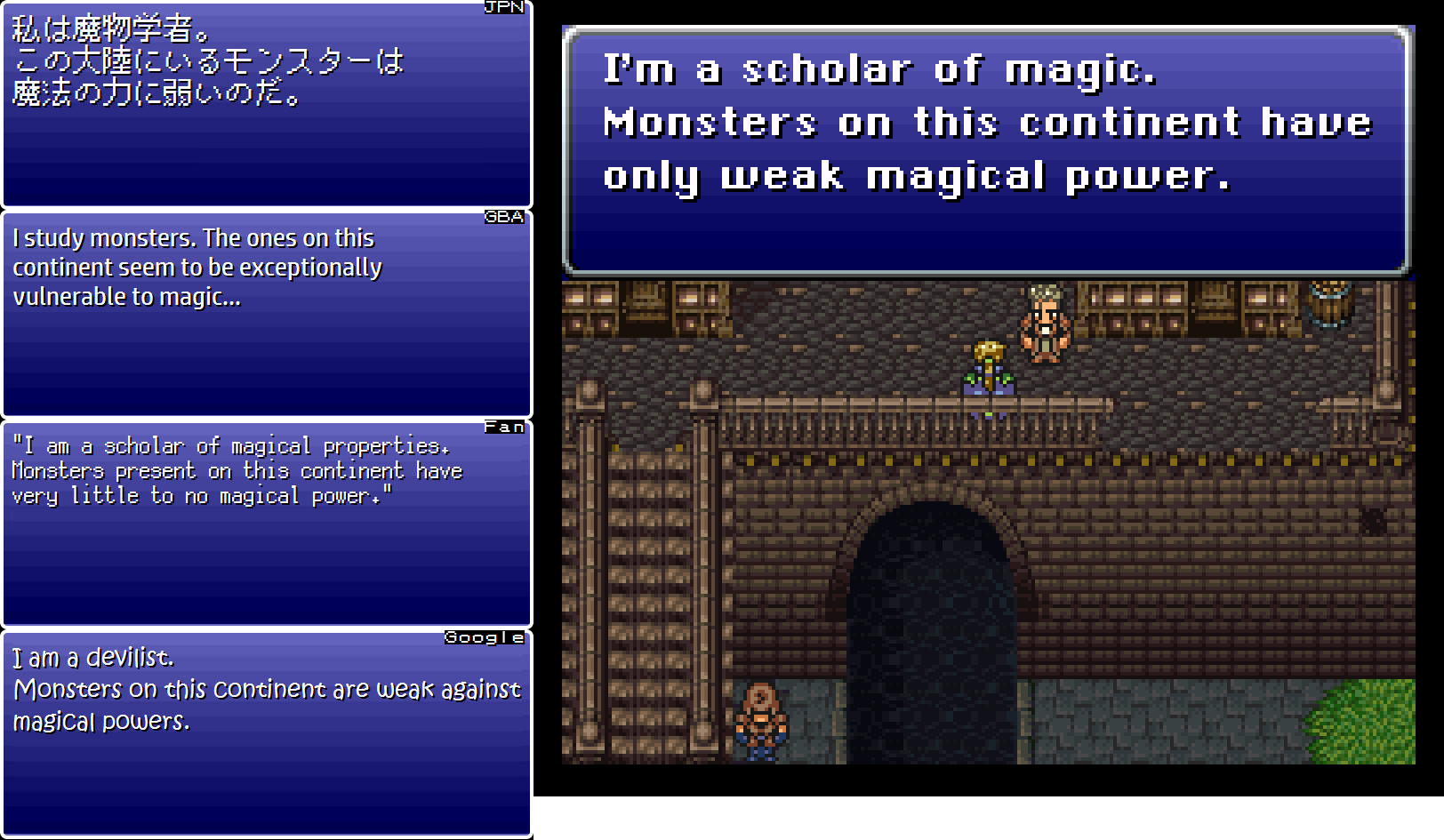
In Japanese, a scholar in Albrook mentions that monsters on this continent are weak to magic.
The Super NES translator misunderstood the line, which turned the line to something very different. Now the scholar says that monsters on the continent have weak magic!
The GBA translation fixes this line. The fan translation clearly copies and rephrases the faulty Super NES translation. It’s not a difficult line in Japanese, so I’m surprised the fan translator didn’t notice this obvious mistake in the Super NES script. In fact, it’s such a straightforward sentence that even Google gets it spot-on.
Whoopie Lady
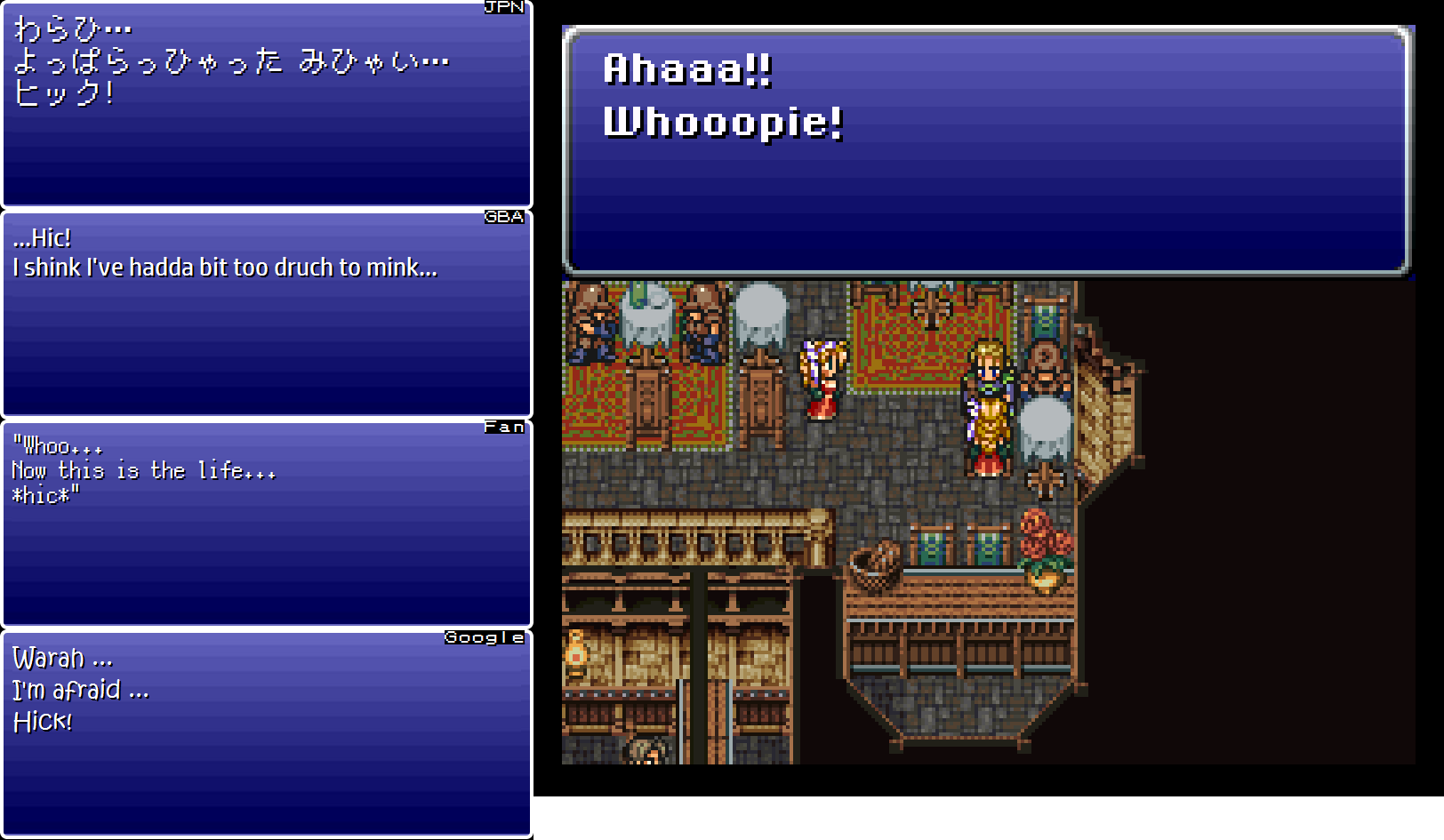
In Japanese, this woman proclaims that she’s drunk. Unsurprisingly, this line was completely changed in the Super NES translation. The GBA translation fixes it in an amusing way, and even the fan translation reverts her back to being drunk – although the only correctly translated part is her hiccup sound.
To be fair though, the lady slurs her words so much that it’s not immediately clear what she’s saying. Drunk talk is hard to understand in any language, so trying to understand it as a non-native speaker can be even more challenging. It’s a topic that’s not taught in schools, obviously, so in the interest of improving drunk people communication, here’s how this line works:
| Drunk Line | Intended Line | Translation |
| わらひ… (wa/ra/hi) | わたし… (wa/ta/shi) | I… |
| よっぱらっひゃった みひゃい… (yo/ppa/ra/hhya/tta mi/hya/i) | よっぱらっちゃった みたい… (yo/ppa/ra/ccha/tta mi/ta/i) | think I’m drunk… |
| ヒック! (hikku) | ヒック! (hikku) | *Hic*! |
Breaking Japanese sentences into their individual syllables makes it easier to analyze drunken dialogue. In my experience, Japanese entertainment writers tend to keep the beginning syllables in a word unchanged to serve as a sort of linguistic handrail. Syllables after that are altered, but usually still rhyme with the intended syllable. As an example, in the drunk line above, the ta in watashi becomes ra and the shi becomes hi. The result: warahi.
On a side note, this same syllable-parsing technique is useful in other situations too, like when trying to decipher spoken Japanese that you don’t fully understand.
Getting Hitched
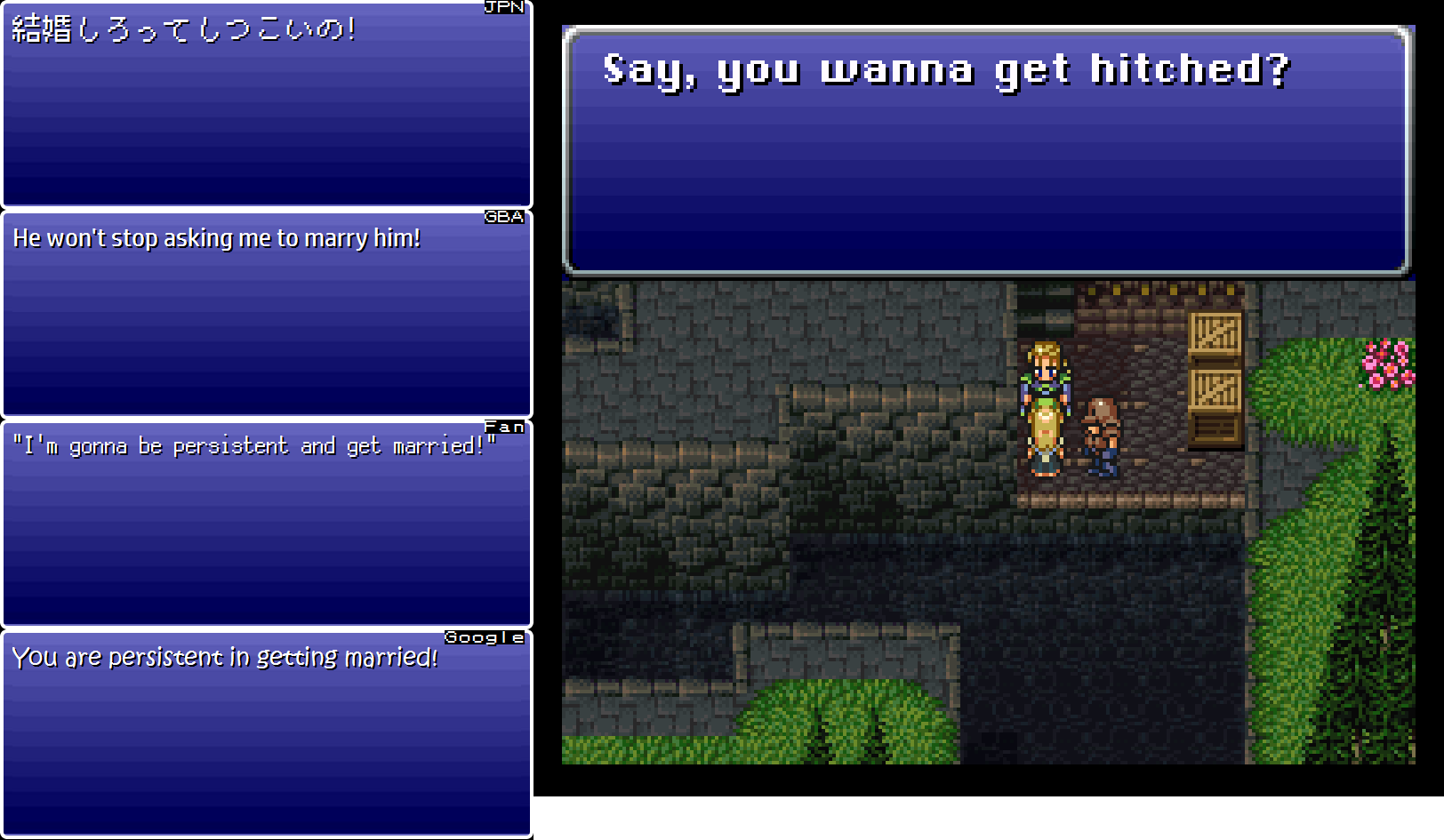
In the town of Maranda, a soldier comically chases a woman around in a never-ending circle.
In Japanese, the woman says that the soldier persistently asks her to marry him. The phrasing leaves out the subject and object, so it’s a bit of a tricky line that requires the player to fill in the blanks based on the context. But it’s at least something along the lines of “Stop asking me to marry you!” or maybe even “He won’t stop asking me to marry him!”.
Due to the unclear phrasing and a lack of context, the Super NES translator mistranslated this line as “Say, you wanna get hitched?”. It’s weird enough that I bet some players without Japanese knowledge or translation experience also felt that this line didn’t seem quite right.
Anyway, the GBA translation fixes this simple problem. The fan translation does it own translation this time, but the grammar and phrasing led to a truly bizarre mistranslation: “I’m gonna be persistent and get married!”.
Royal Family
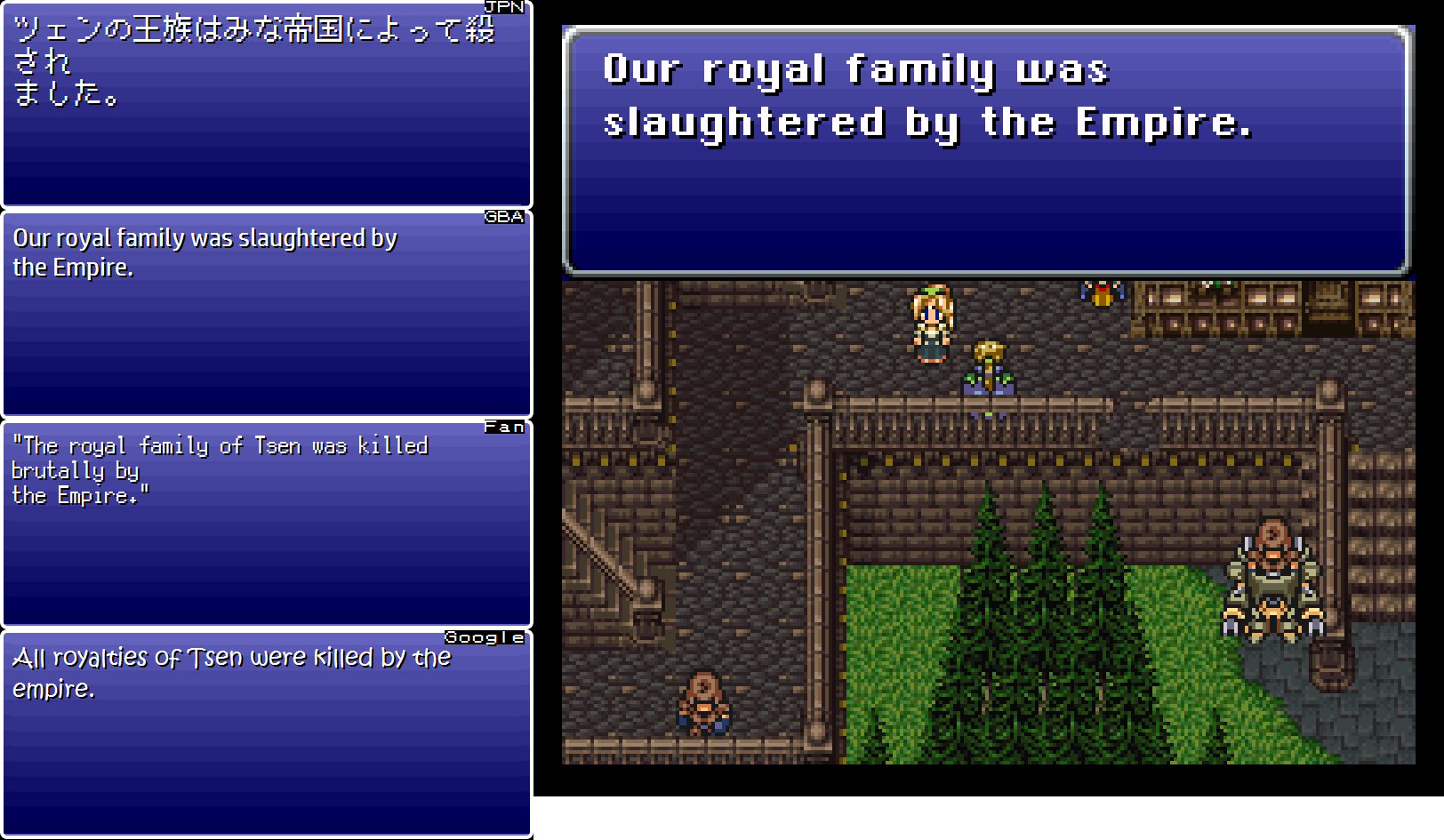
Every mention of killing and dying has been wiped away from the Super NES translation so far, so it was surprising to see this mention of a family getting “slaughtered” was left untouched.
Sliding Kid
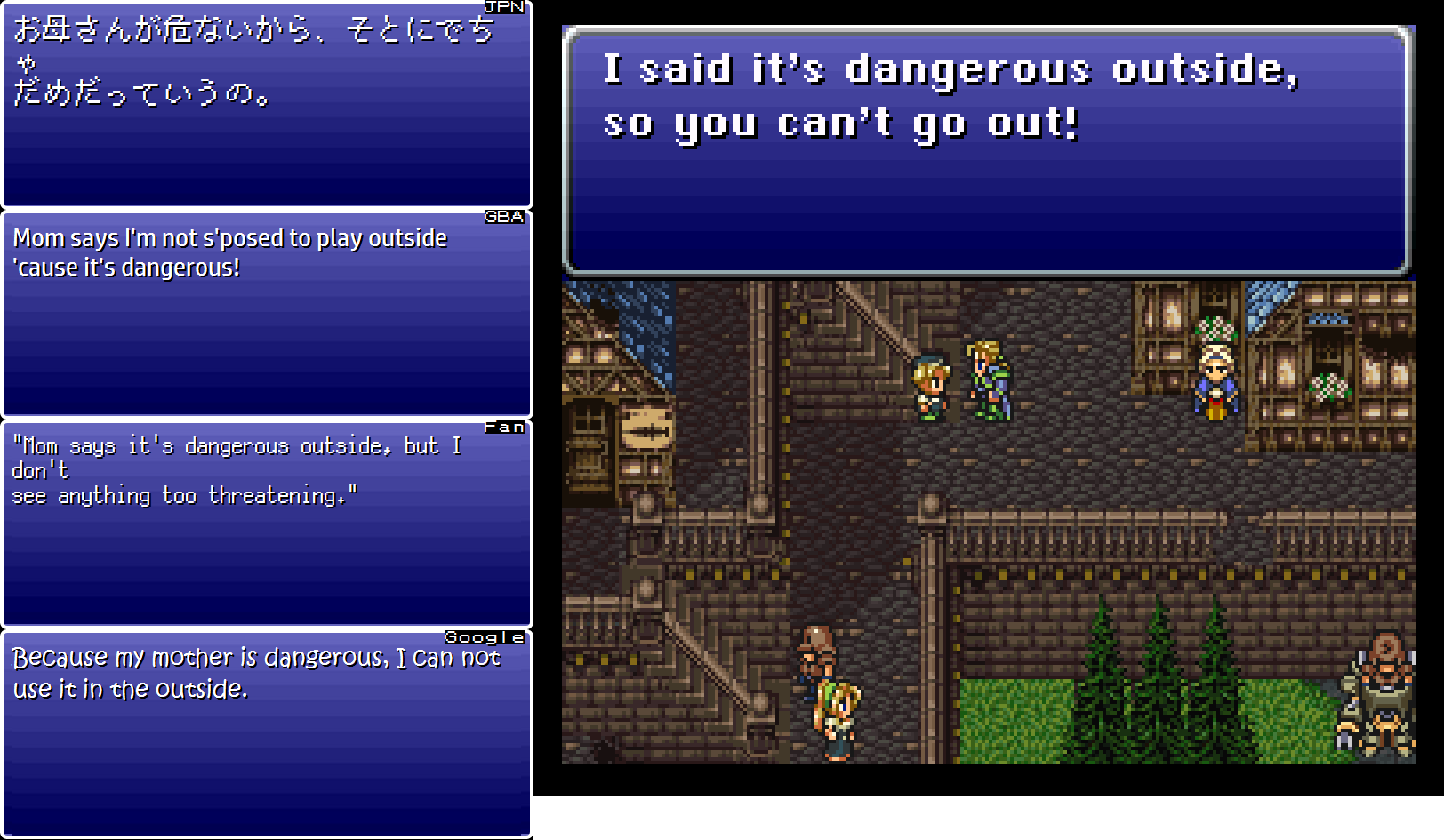
A woman in Tzen mentions that her child has run off somewhere even after she said it was dangerous to go outside.
If you find and talk to the boy, he says something weird in the Super NES translation:
I said it’s dangerous outside, so you can’t go out!
That doesn’t seem right – why would he be saying that? Some chatters in the stream suggested he was making fun of his mom by repeating what she told him, but my instinct says that isn’t quite right either.
Checking the Japanese script, we see that he actually says:
Mom says I can’t play outside because it’s dangerous.
The Japanese line is very clear and straightforward, so this appears to be another weird and basic mistake by the Super NES translator. The GBA translation fixes the mistranslation, while the fan translation does its own translation of the line but gets part of it wrong and/or adds new stuff out of nowhere.
Google has changed the entire family relationship.
Danger Danger
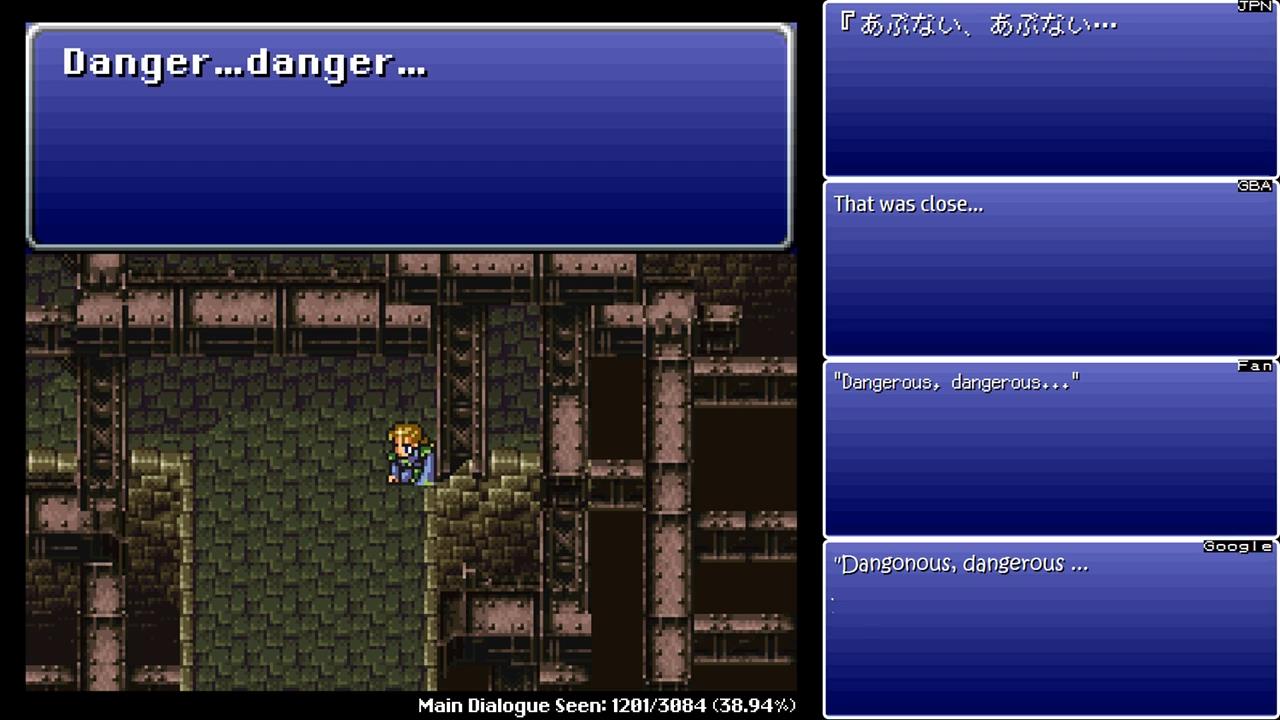
If you get into a battle with soldiers while exploring the Imperial capital of Vector, you’ll get sent back to the entrance of the city. Someone in the party will also say, “Danger…danger…” in the Super NES version. This line always felt strange to me, even back when the game was first released.
The Japanese line is あぶない、あぶない… (abunai, abunai...). The word abunai has a wide reach and can mean a bunch of different things, most of which boil down to “dangerous”. That’s why the Super NES line says “danger, danger”.
But in some situations – like this one in Vector – abunai is used after narrowly avoiding something, much like “That was close!” in English. The GBA translator picked up on this and updated the line to use the intended “that was close” meaning.
The fan translator wasn’t familiar with the multiple uses of abunai and went with the first translation you’d find in a dictionary. I have no idea what Google was thinking though.
Kefka Trivia
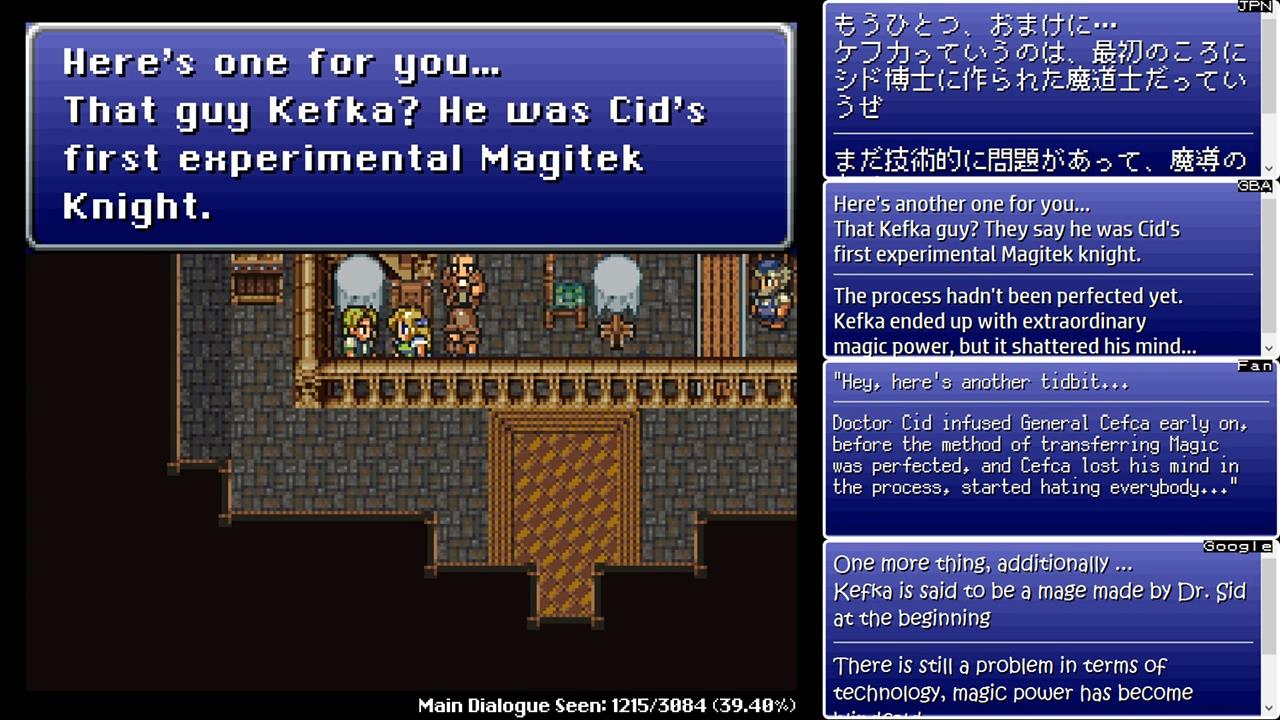
A guy in Vector’s pub shares some important story info, some of which involves Kefka’s backstory. In the Super NES translation, this guy says:
That guy Kefka? He was Cid’s first experimental Magitek Knight. But the process wasn’t perfected yet. Something in Kefka’s mind snapped that day…!
I’ve been looking forward to checking this particular line, and it seems the wait was worth it – the original Japanese text includes some extra details and some slightly different information:
They say Kefka is one of the first mages created by Dr. Cid. Supposedly there were still issues with the technology, so he wound up with extraordinary magic power, but his mind was broken.
This brings up a couple things of note:
- The term “Magitek Knight” in the Super NES translation is the same 魔導士 (madōshi) term that has appeared before in the Japaense script. It’s mostly just a generic term for a wizard, mage, or sorcerer, especially in the Final Fantasy games – Rosa from Final Fantasy IV is called a “white madōshi”, for example, and Vivi from Final Fantasy IX is a “black madōshi”. Basically, the unique term of “Magitek Knight” is misleading in the Final Fantasy VI translations, as plenty of madōshis existed 1000 years ago too.
- Kefka wasn’t necessarily the very first one to experimented on, as is claimed in both official translations. He was just one of the first.
- The Japanese line explains that technological issues made Kefka extra powerful, but this is missing from the Super NES translation. I guess that extra detail does sort of explain how he gets so strong so quickly as the game progresses.
We can see that the GBA translation reintroduces text that was cut out of the Super NES translation, but it also leaves in the mistake about Kefka being first. The fan translation actually gets that detail correct by saying “early on” rather than “first”. But the fan translation also adds in some new text out of nowhere about how the procedure caused Kefka to hate everybody.
Getting Sick
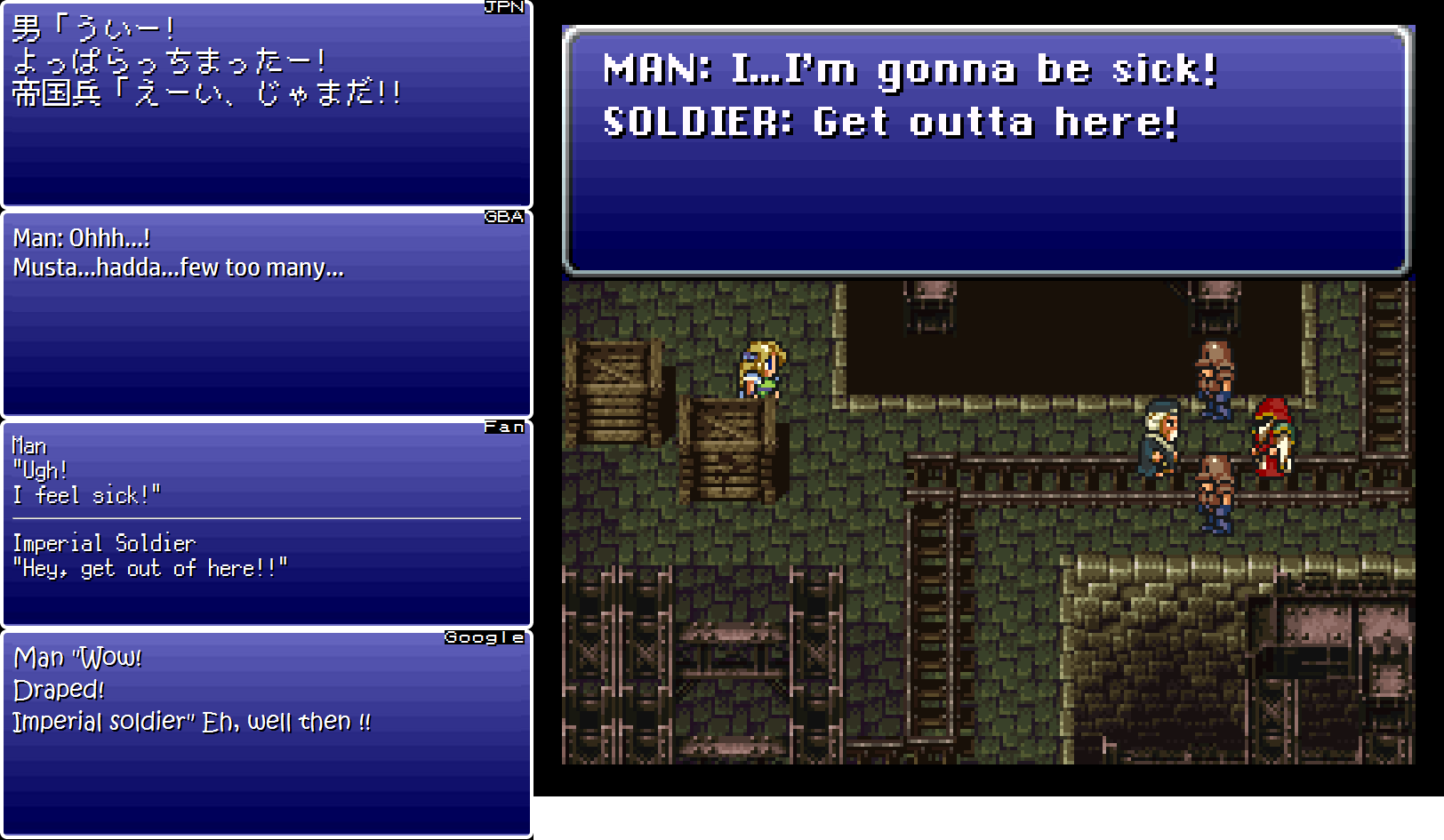
An old man distracts some Imperial guards so the heroes can sneak by. In Japanese, the man does this by acting drunk and literally saying that he’s drunk. This line was altered to “I… I’m gonna be sick!” in the Super NES translation.
The GBA translation changes things back a little, but isn’t as on-the-nose with the declaration of drunkenness. The fan translation more or less copies the Super NES translation. Given that the fan translation also messed up the “whoopie” lady’s line back in Albrook, I think maybe the translator wasn’t familiar with the Japanese phrase for “I’m drunk”.
All Powerful
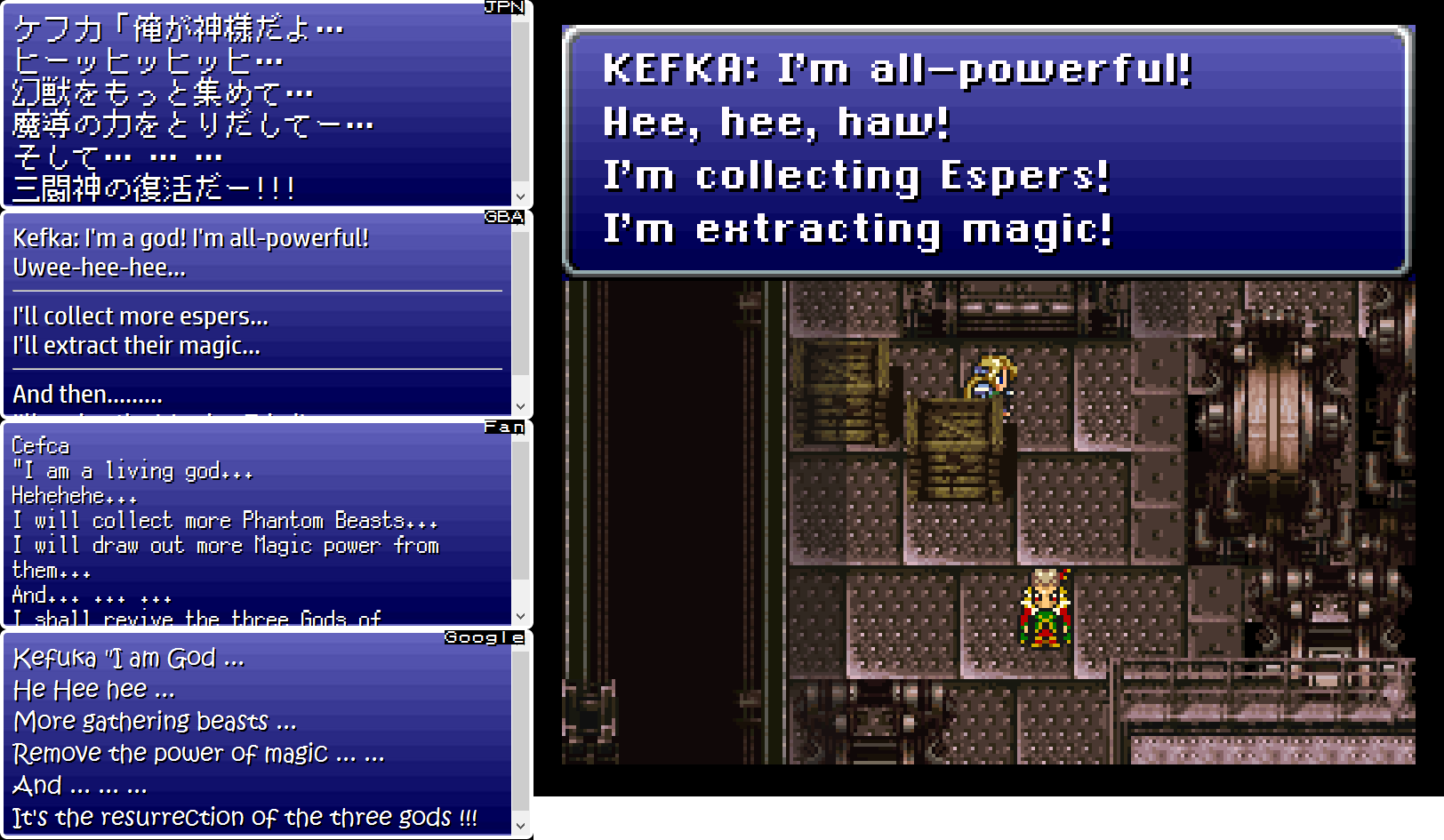
In Japanese, Kefka declares that he’s God. This was changed to “all-powerful” in the Super NES translation to adhere to Nintendo’s content policies at the time. The GBA translation puts the religious content back in, but also inserts the “I’m all-powerful!” line from the Super NES translation afterward. The fan translation goes with “I am a living god”.
The Statues
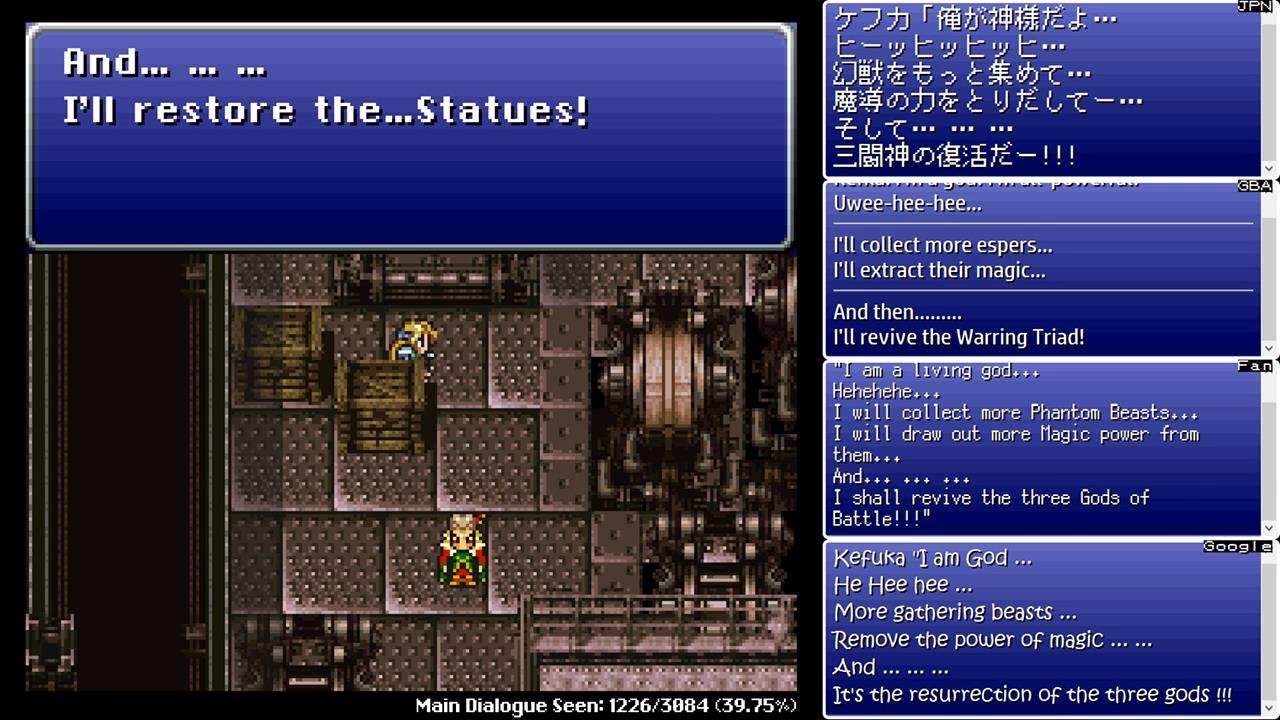
Kefka also announces that he’s going to revive the 三闘神 (santōshin), which we later learn are three supreme magical beings that are currently in statue form or have had important statues of them made.
This santо̄shin is of those names that can be translated in a hundred different ways with no single “correct” one. First, let’s look at the idea behind each character in the name:
- 三 means “three”
- 闘 refers to fighting, combat, conflict, strife, and that sort of thing
- 神 refers to gods, deities, certain types of spirits, and other things along those lines
Again, there are multiple ways of handling made-up, fictional names like this in translation. If you missed it, we previously looked at five different methods when examining the “Magicite” name.
Anyway, the Super NES translation ditches the religious references and calls them the “Statues”. I assume this short name was chosen partly with SNES memory limitations in mind.
The GBA translation drops the “Statues” name and comes up with something new: the “Warring Triad”. The fan translation chooses “Gods of Battle”, and Google simply goes with “three gods”. It’s surprising to see that the machine translation system actually understood the made-up term to some degree.
Scientific Equipment

In Japanese, Ifrit mentions that he was put inside a beaker and had his power drained from him. The actual word he uses is ビーカー (bīkā), which is just the English word “beaker” pronounced with Japanese syllables.
By itself this isn’t a big deal, although when I think of a beaker I think of the small containers used in chemistry classes and not giant vats for holding living beings. Apparently every other translator felt the same way about this weird use of “beaker”, because:
- The Super NES translation calls them “glass tubes”
- The GBA translation calls them “capsules”
- The fan translation calls them “test tubes”
This is a good example of how English words can change slightly when used in Japanese, and how translators try to compensate for such changes. I feel like there’s still some better technical English word out there for the giant glass tubes holding the Espers though.
Esper Trio
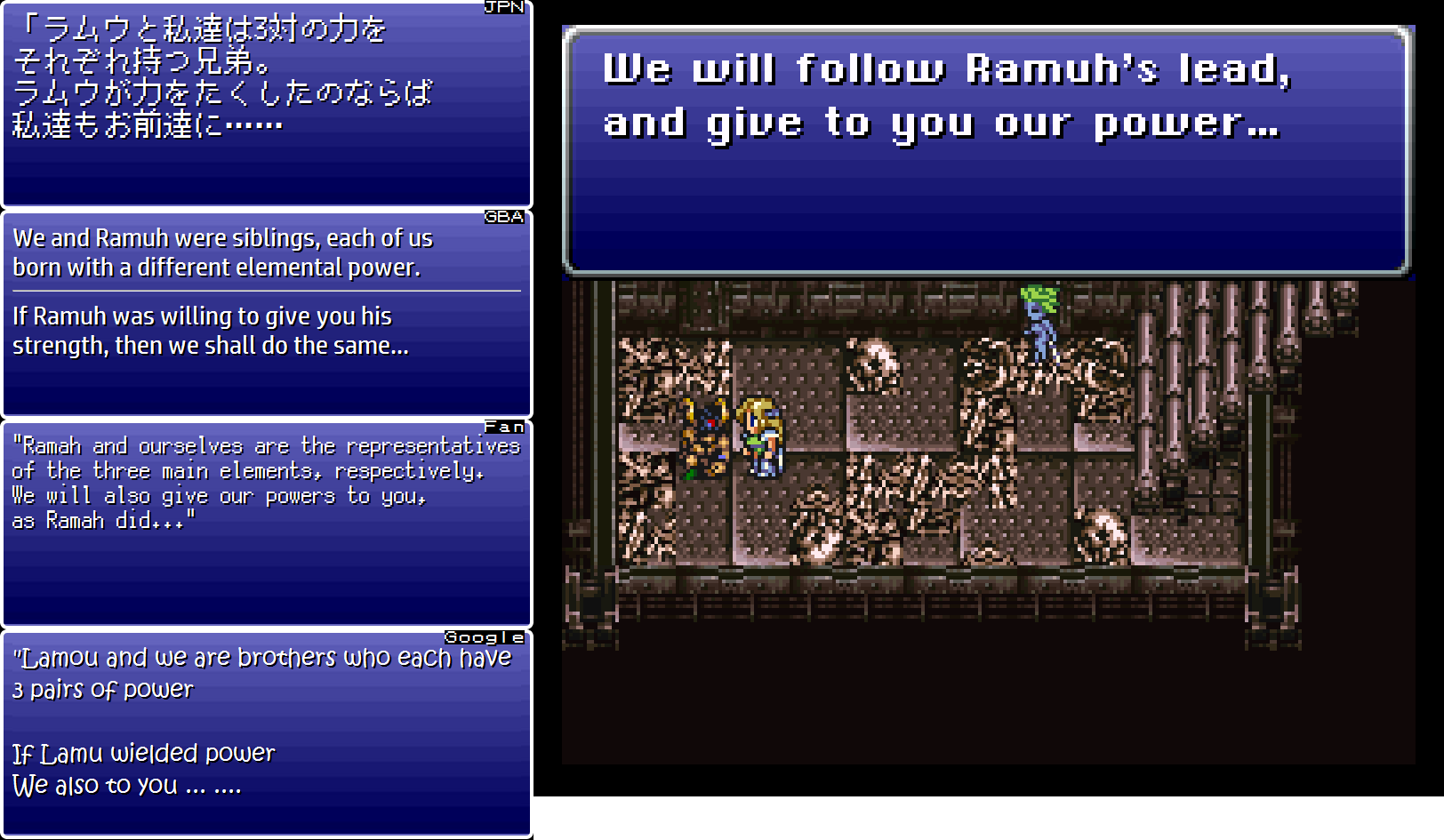
In Japanese, Ifrit mentions that he, Shiva, and Ramuh are siblings, each with their own power. This detail – and in fact this entire sentence – was dropped from the Super NES translation. The GBA translation puts it back in. The fan script makes a good attempt at translating this line, but misses the sibling part entirely and calls them “representatives” instead.
Magicite 101
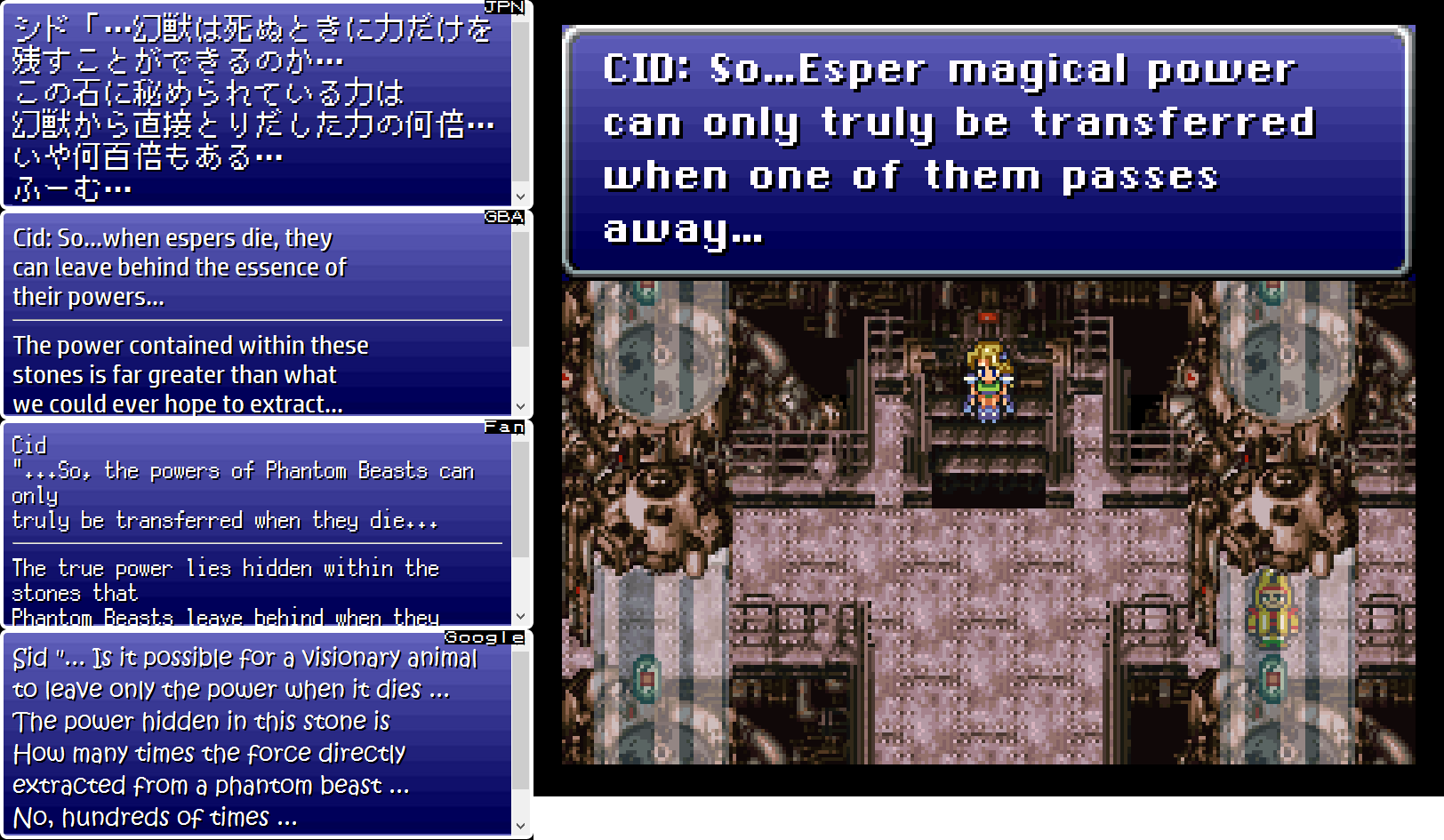
Thanks to the heroes, Cid finally discovers the secret to obtaining an Esper’s full power. In Japanese, this revelation accompanies this dialogue:
So, when Espers die, they’re able to leave behind just their power…
The power contained within these stones is many times– no, HUNDREDS of times stronger than the power obtained from Espers via direct extraction…
This goes to show just how powerful Magicite is. I always knew that Magicite was stronger than the old extraction method, but not this much stronger. That’s because the Super NES translation actually drops a bunch of text in this line. The GBA translation puts the missing text back in, but removes the talk about specific numbers for comparison purposes.
The fan translation gets the line very wrong:
…So, the powers of Phantom Beasts can only truly be transferred when they die…
The true power lies hidden within the stones that Phantom Beasts leave behind when they die… All of those hundreds of Phantom Beasts…
Part of this line is based on the altered Super NES line, and the other part of the line is a complete mistranslation. It seems the translator recognized the word “hundred” in the Japanese text, but didn’t quite understand Japanese grammar enough to see how it fits into the line.
Celes’ Changes
When I first started this big comparison project, one or two people asked me to keep an eye on Celes’ speech style in Japanese, as it apparently changes over time. And it’s true: she speaks sternly and very to-the-point in Japanese at first, but as soon as she puts on the opera dress, she starts speaking more femininely and continues that way even afterward.
Of course, Celes hasn’t had many new lines of text since the opera, but I have noticed that she’s started to use the occasional feminine speech particle like wa and no.
Even now, far away from all the opera stuff, she uses feminine speech:
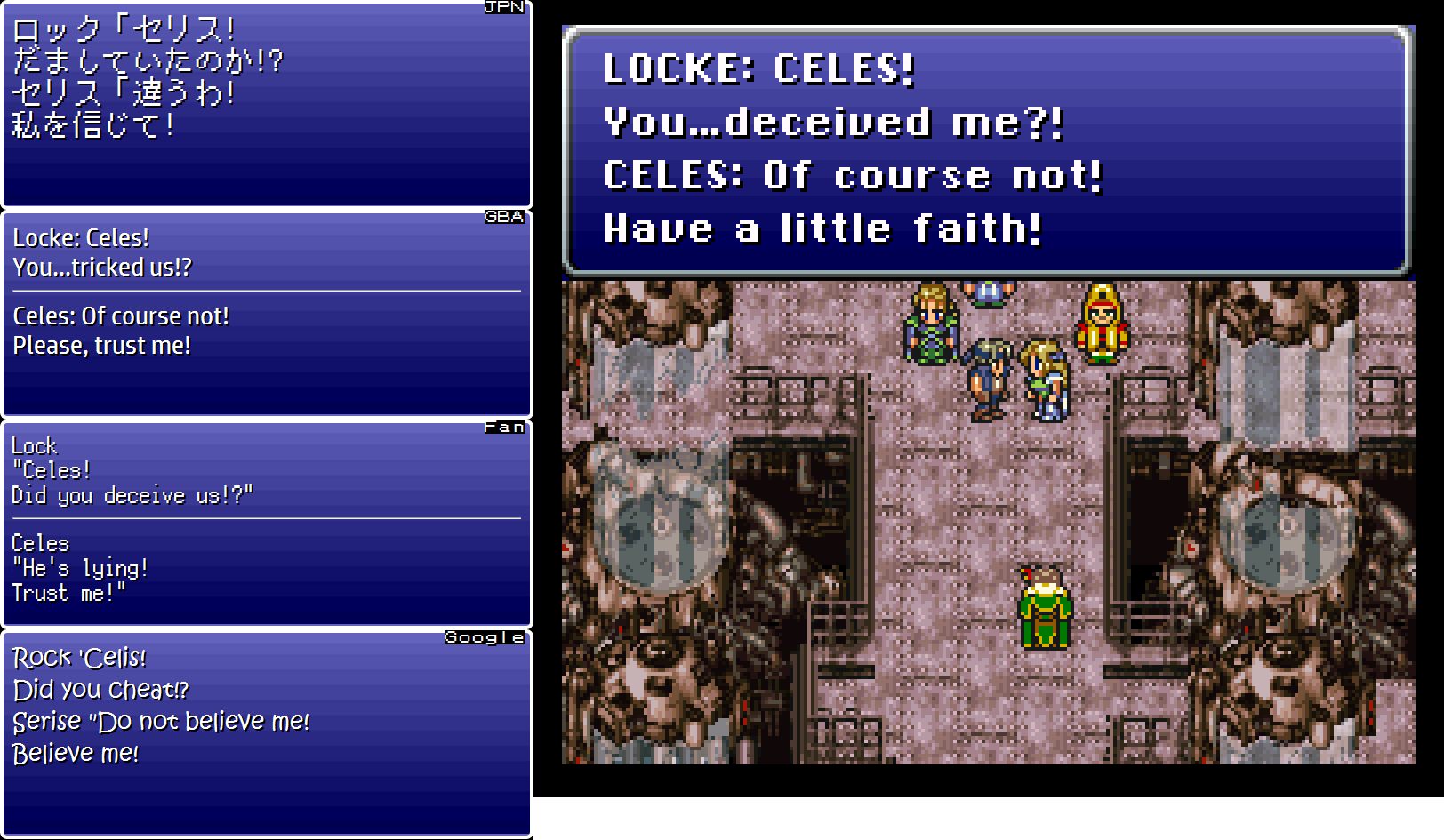
I’ve heard her speech continues to move in this direction as the game goes on, but I don’t know if that’s true or not. As we progress through the game I’ll be sure to watch for any further developments.
Ruptured Capsules
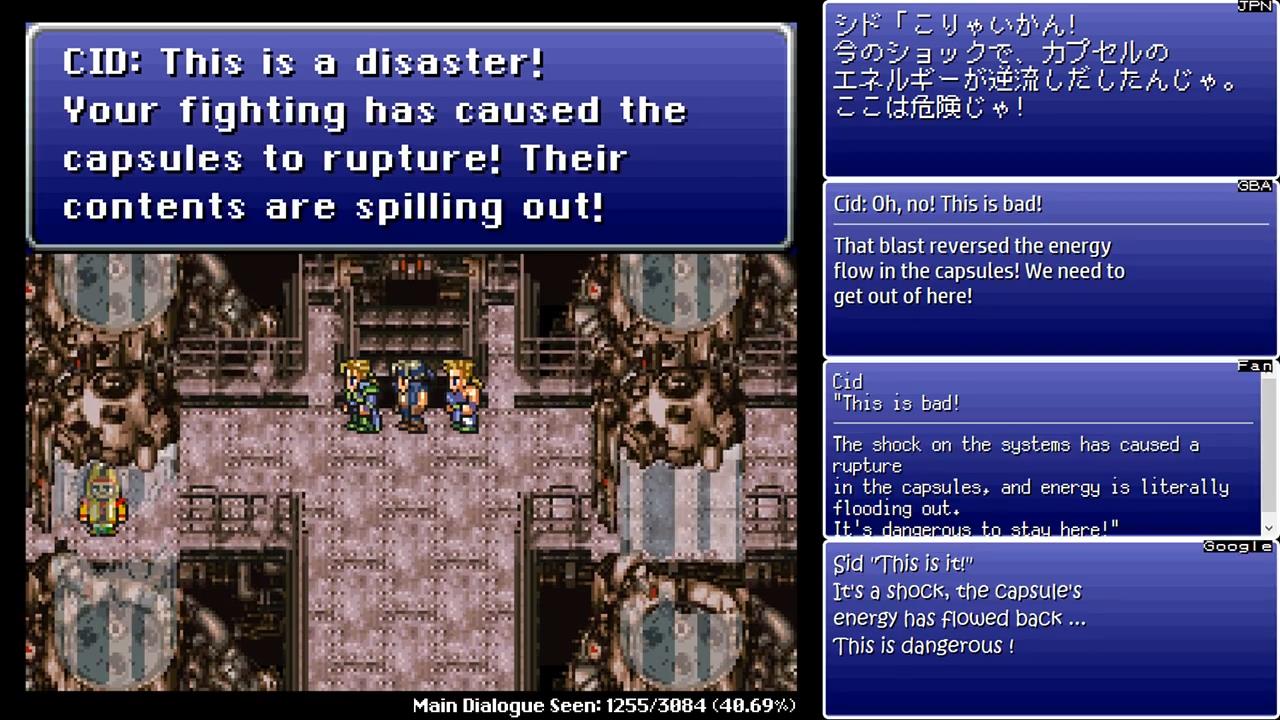
The factory is thrown into chaos after Celes saves the day with a mystery spell. In the Japanese script, Cid says that they’re in danger because the capsules’ energy flow has reversed.
The Super NES translation mishandles the line and says that the fighting has caused the capsules to rupture and that their contents are spilling out. The GBA version properly translates the line, while the fan translation is mostly a rephrasing of the Super NES line combined with some genuinely re-translated (but mistranslated) content.
Incidentally, unlike Ifrit’s use of the word “beaker” earlier, Cid uses the word “capsule” here.
Awful Things
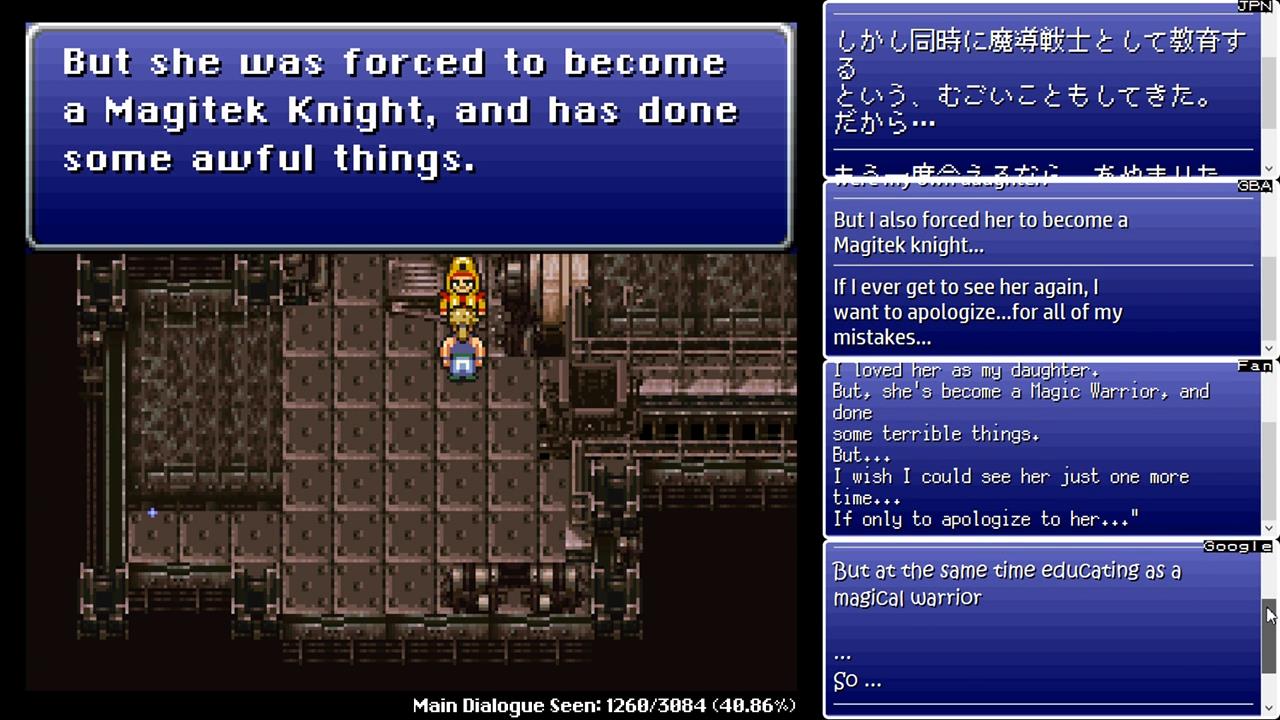
Cid explains how he cares for Celes and feels terrible about what he’s put her through. In the Super NES translation, he continues by saying:
But she was forced to become a Magitek Knight, and has done some awful things.
But this is incorrect. In Japanese, he actually says that he was the one who did something awful by raising/training her to be a mage.
The GBA translation fixes the mistake and uses wording that implies the “awful” idea instead of stating it outright. The fan translation follows the incorrect Super NES translation.
This translation issue isn’t as problematic as other issues we’ve seen, but since this is the first we’ve really heard about the relationship between Cid and Celes, I thought I’d mention it now in case more changes pile up later.
Meeting Maduin
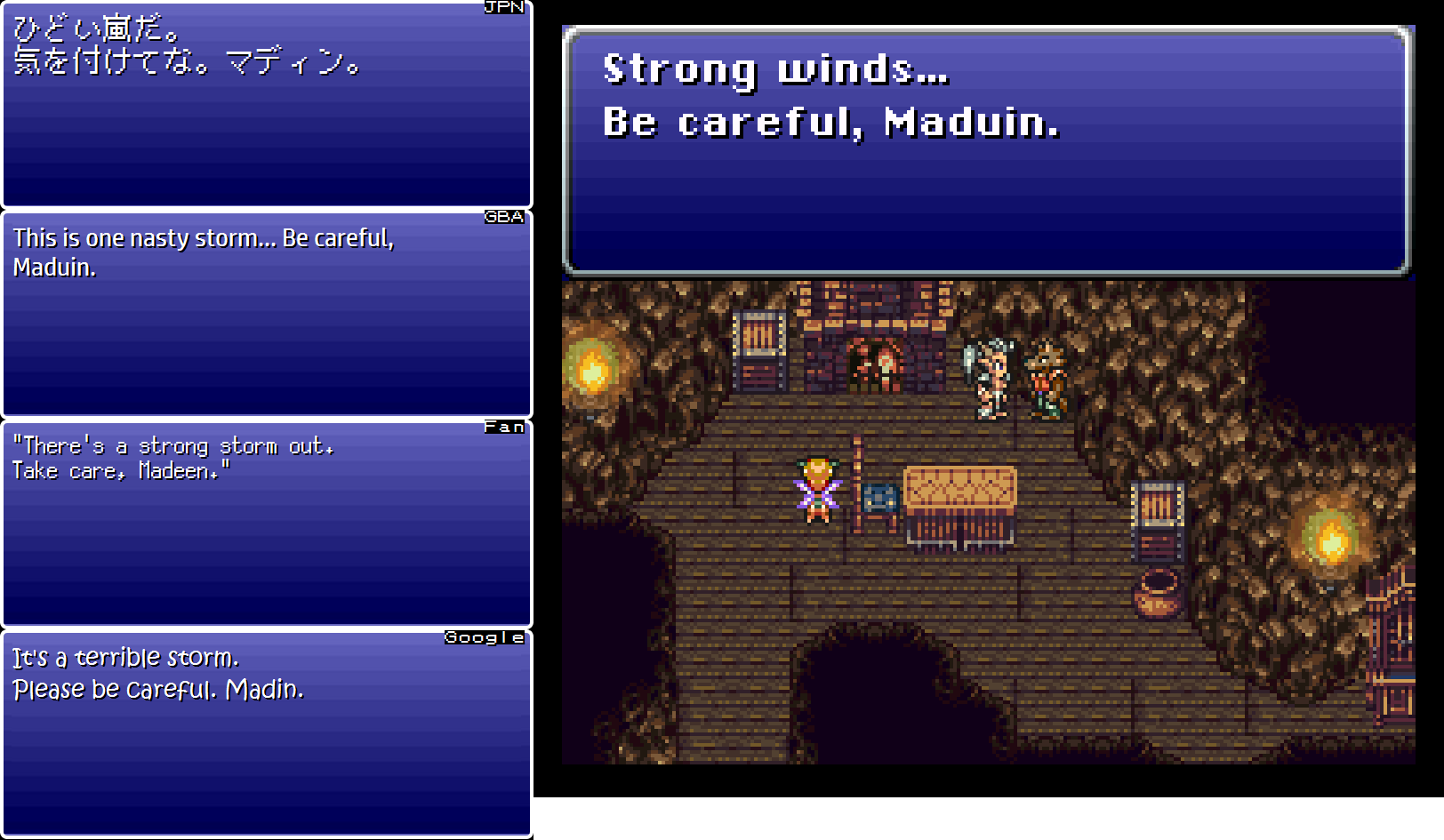
Terra’s father is an Esper. In Japanese, his name is マディン (Madin), but this became “Maduin” in the Super NES translation and was kept the same in the GBA translation.
I never knew why this name change occurred or what “Madin” is even supposed to reference, if anything. Chatters in the stream looked it up and apparently it’s a reference to Máel Dúin, the main character of an old Irish tale. I can’t vouch for the accuracy of this claim, but it seems convincing enough to me.
The fan translation goes with “Madeen” to more clearly match the Japanese pronunciation of the name. But as far as I can tell, there’s no specific reference behind this spelling choice.
On a different note, the whole flashback scene that takes place in the Esper World has a strangely consistent translation issue in the Super NES version. Everyone is talking about how there’s some crazy storm going on in the Japanese script, but “storm” is almost always translated as “wind” in the SNES script. I’m not really sure why this is – all I can think of is that the Japanese character for wind (風) and the character for storm (嵐) do look somewhat similar, especially when using tiny fonts. Any other theories I come up with seem pretty weak, like trying to save game memory.
The GBA translation fixes this “wind” problem and changes everything back to “storm”. Even the fan translation and Google get the storm thing correct.
Gated Community
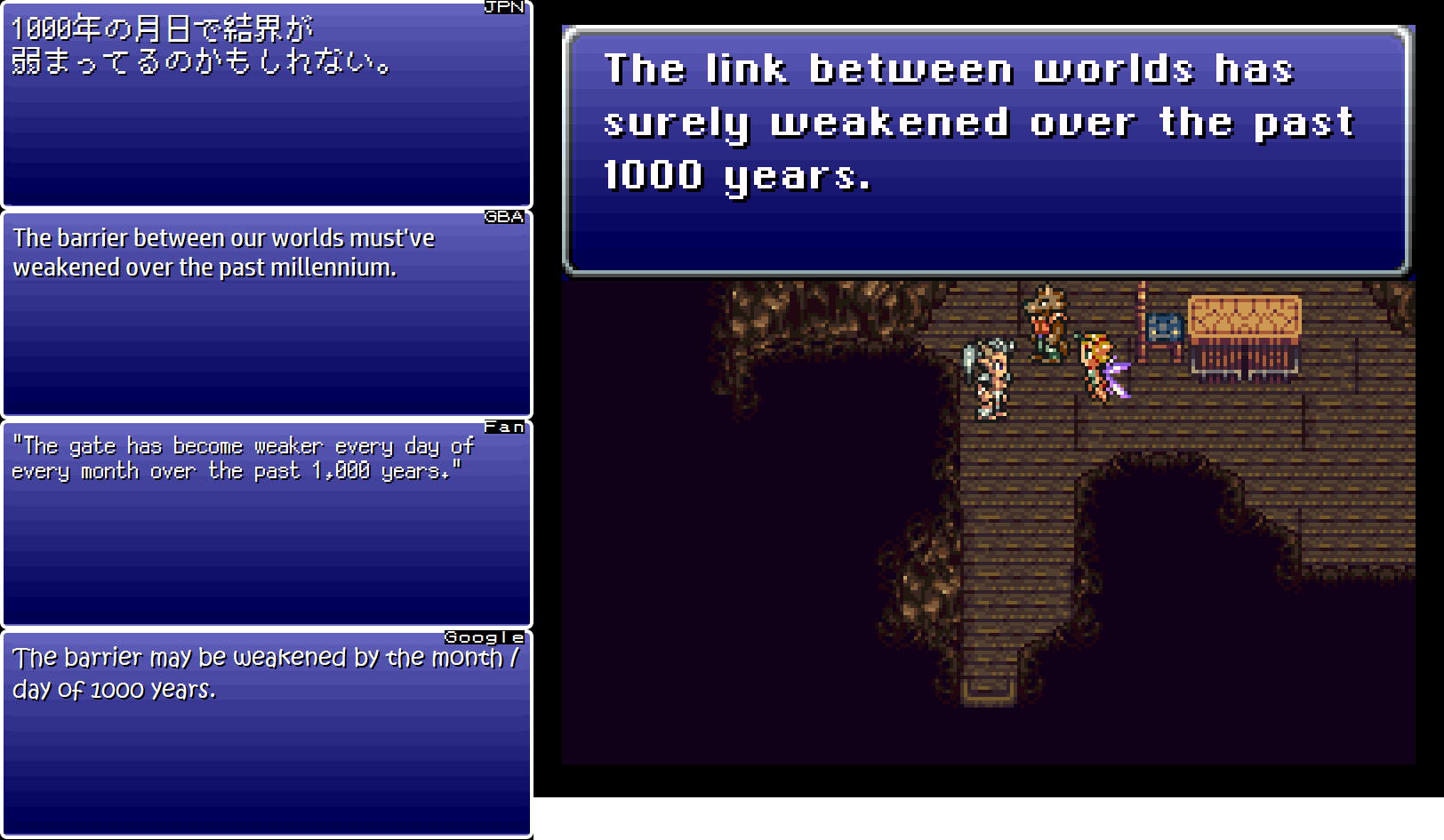
Earlier in the game, Ramuh gave a brief overview of the history of the Esper World. We discovered that the translated scripts tangle the facts up, while the Japanese script makes it very clear: after the big War of the Magi, the Espers went to some spot in this world, erected a magical barrier around it, and called it their own realm/world. But some humans eventually found them and caused trouble, so the Espers finally erected a physical door to keep the humans out for good.
The translated versions continue to use a messy mix of terms that makes it hard to follow how exactly the Esper World connects with the outside world. One example was a stream favorite: “the link between worlds”.
Madonna Talks
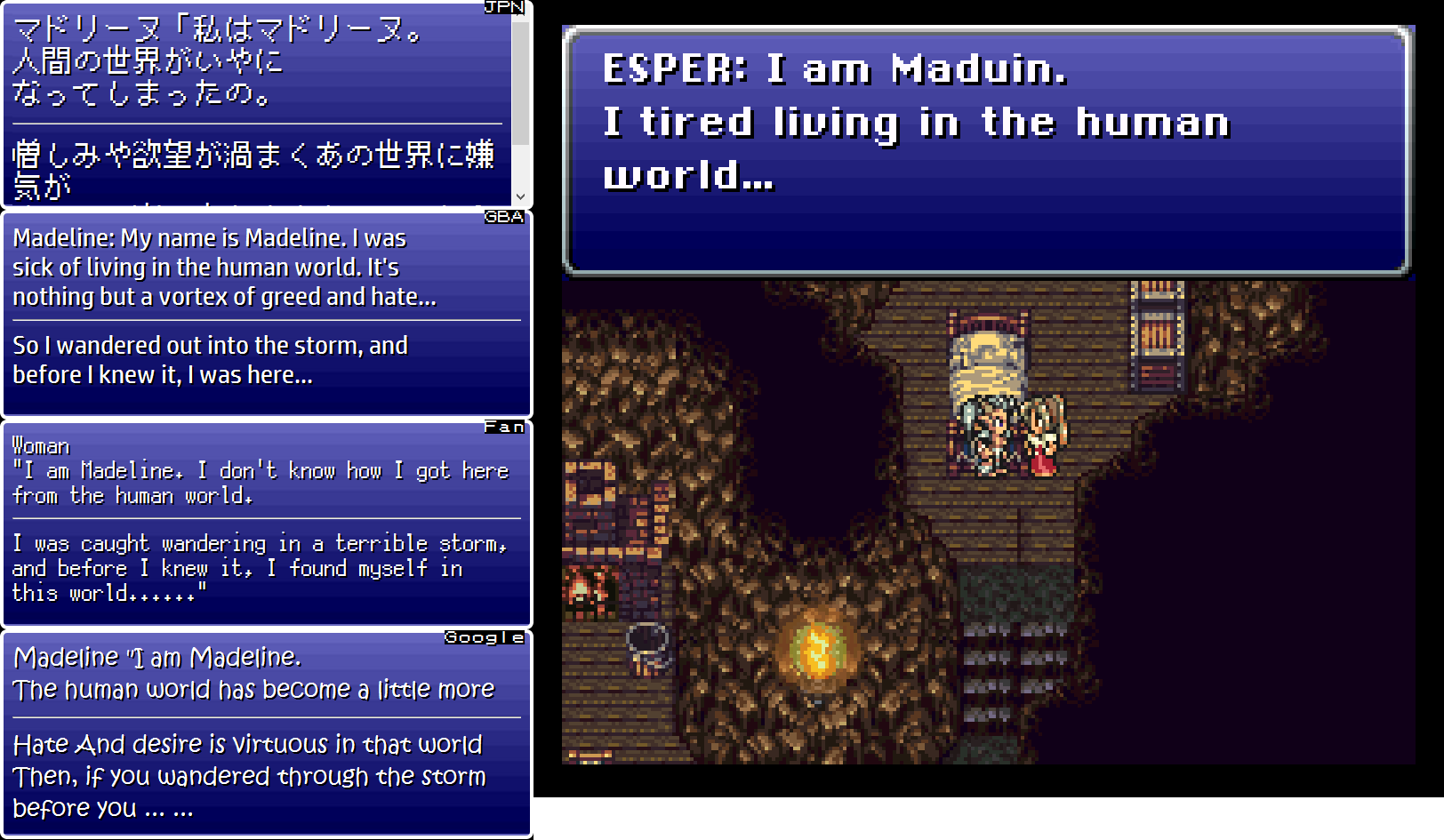
Terra’s mother is named “Madeline” in Japanese, but this was changed to “Madonna” in the Super NES translation. I’m not really sure why the name was changed, but her name is reverted back to “Madeline” in the GBA, fan, and machine translations.
The Super NES translation makes a major mistake with her introduction too:
| Japanese Version (basic translation) | Super NES Translation |
| Madeline: I’m Madeline. | ESPER: I am Maduin. |
| I grew sick and tired of the human world. | I tired living in the human world… |
Somehow the line was taken from the girl and given to the Esper! The line was even changed to use Maduin’s name instead of Madeline/Madonna’s name.
The two names do look vaguely similar if you’re not paying attention, so my theory is that the Super NES translator mistook Madeline’s Japanese name for Maduin’s Japanese name. As a result, we never see Madonna’s name formally introduced – the text boxes just suddenly start calling her that out of nowhere. I guess that’s why this scene always felt kind of off to me – it’s a weird name that makes me think of the real world pop star and the weird name just suddenly appears.
Gate Girl
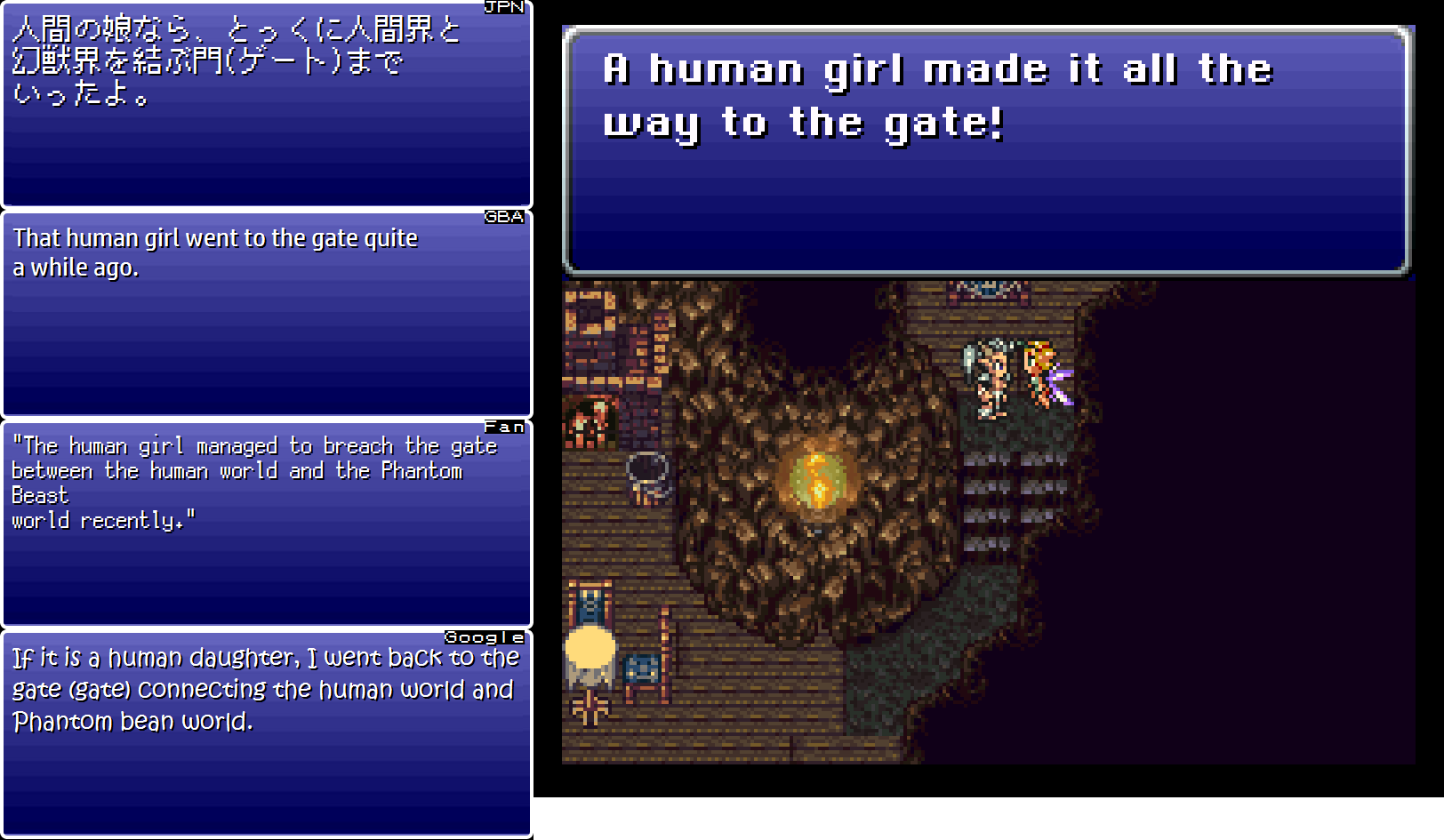
In this Japanese line, we see that the word 門 (mon, "gate") has something in parentheses after it. That “something” is a note about how you’re supposed to pronounce the word – except in this case it’s saying to pronounce it like the English word “gate”.
If this game had been on a more modern console, we would’ve seen the text in parentheses printed on top of 門 instead. This is an example of Japanese furigana in action. The topic of furigana takes some time to explain, but it’s really interesting and helpful to know. Luckily, I wrote an entire article about it here a few years ago!
Housing Crisis
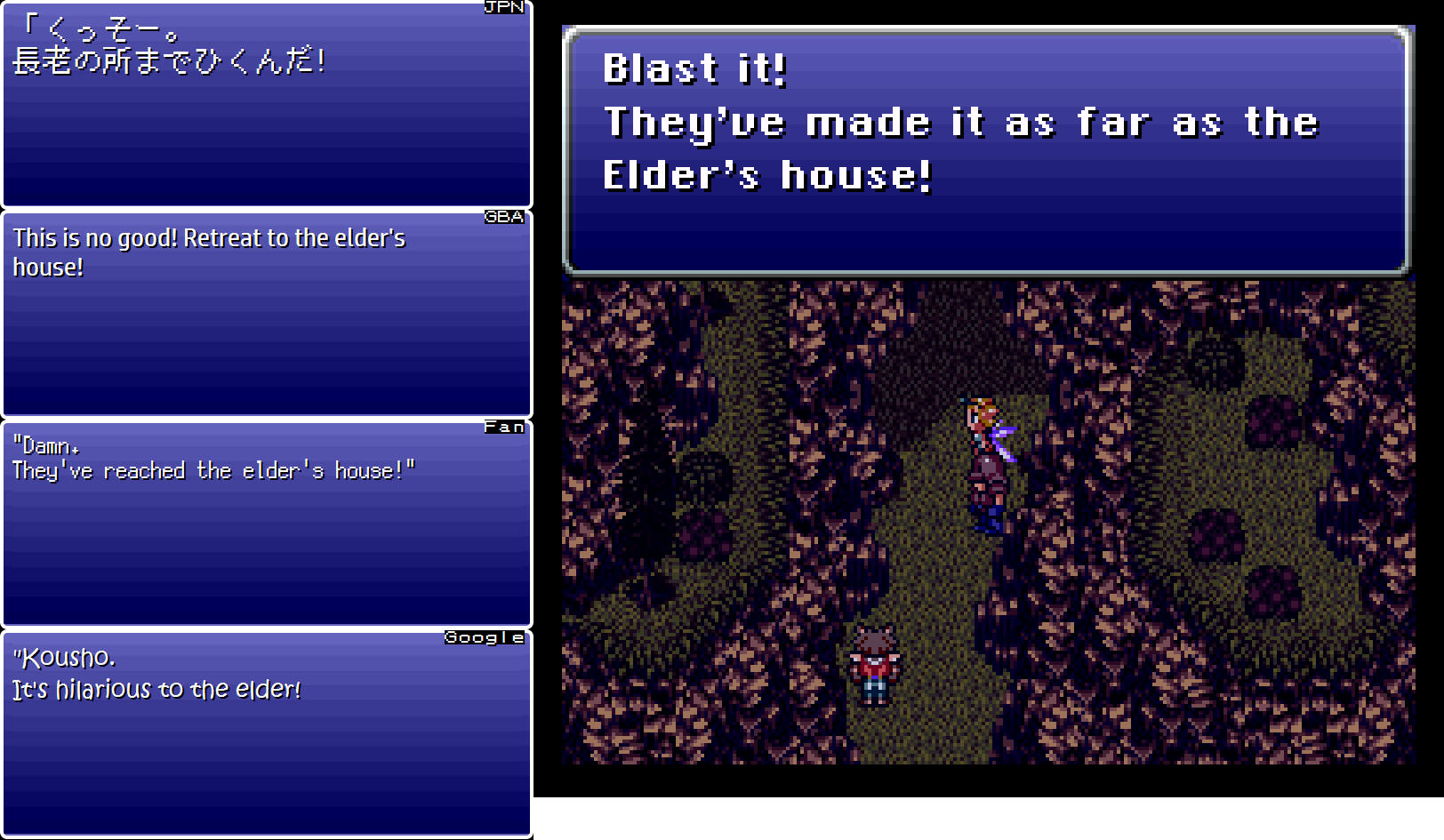
After Imperial soldiers invade the Espers’ village, one villager says in Japanese:
Damn! Retreat to the elder’s house!
The Super NES translation gets this line wrong and instead says that the invaders have reached the elder’s house.
The GBA translation fixes this mistake. The fan translation copies the incorrect Super NES line but makes sure to put “damn” back into the line.
Group Effort
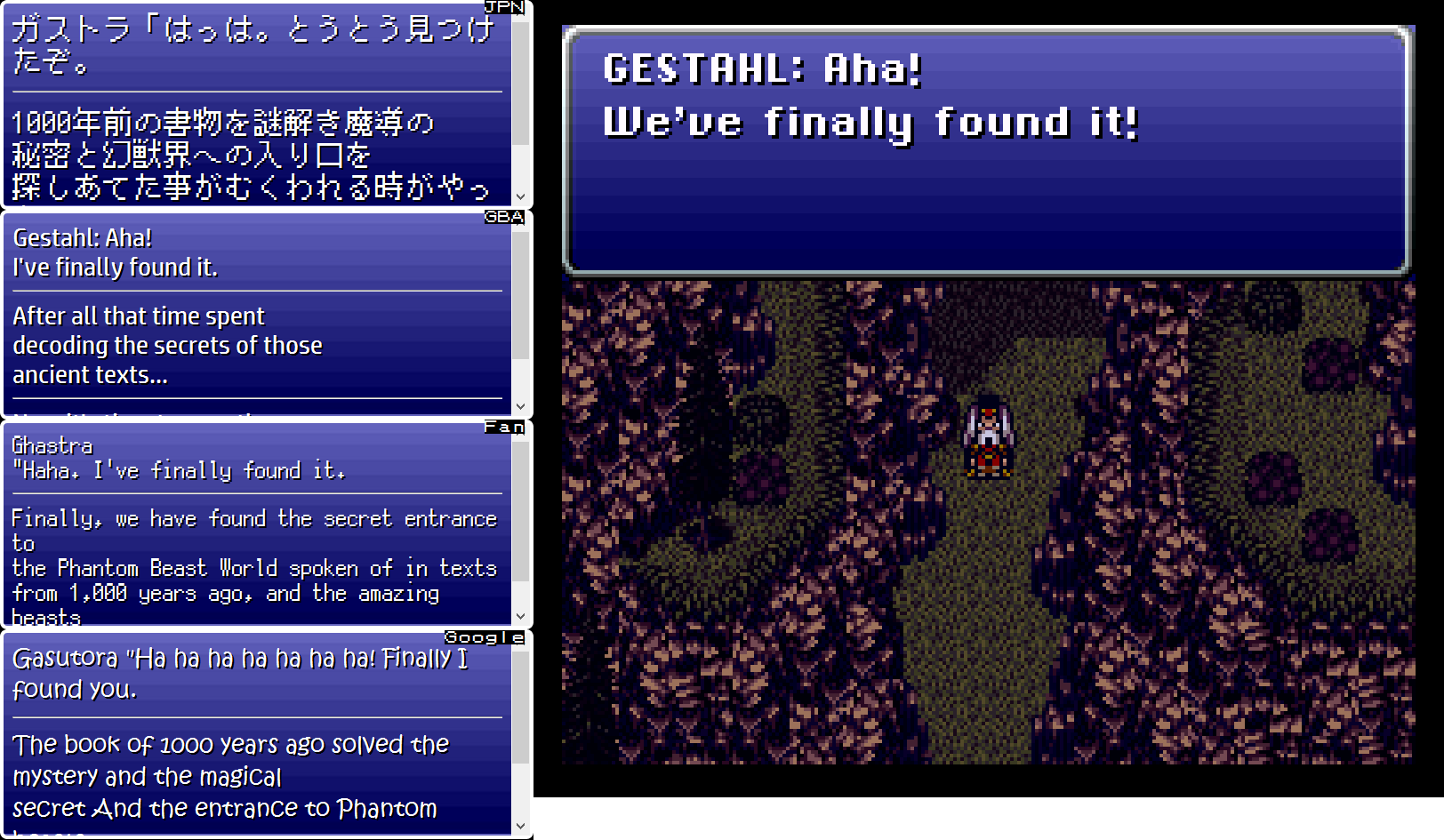
I’ve noticed that whenever Emperor Gestahl talks about stuff in the Super NES translation, he often uses the word “we” or “us”. He says stuff like:
- We’ve finally found it!
- We will own this world!
- Just when we were in reach of a veritable bonanza…!
In Japanese, though, he’s clearly only thinking about himself and uses “I” and “me” everywhere instead. I guess you could argue that maybe he’s using ”we” in the majestic plural sense, but given how he talks otherwise in English, I don’t really feel that that’s the case.
In any case, the GBA, fan, and machine translations all follow the original Japanese text and use “I” and “me”.
Gate Closure
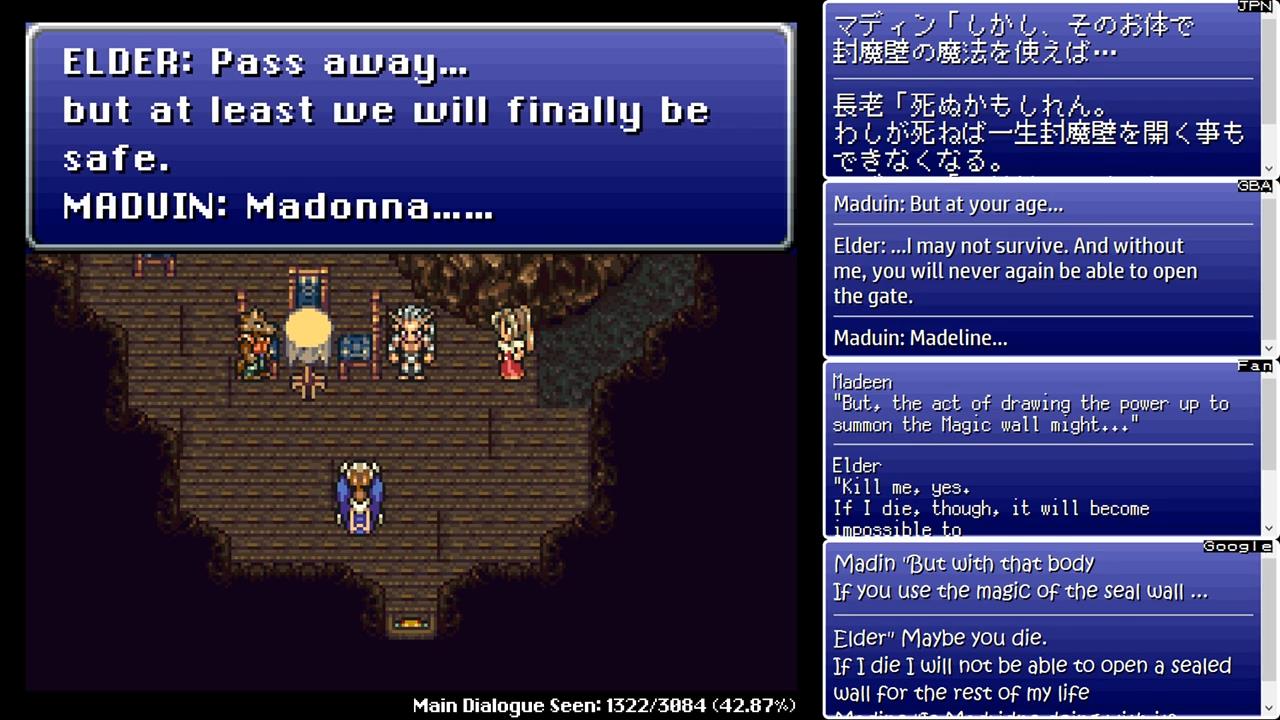
The Esper elder says that he intends to use a spell to get rid of the Imperial invaders and keep them out for good. Casting the spell will likely kill the elder, though.
In the Super NES translation, this information is explained like this:
MADUIN: But in your state, you might just…
ELDER: Pass away… but at least we will finally be safe.
This makes logical sense and never seemed odd to me before, but the Japanese line gives more important details:
Madin: But, if you use the Magic-Sealing Wall spell in your condition…
Elder: I might die. Once I die, it will be impossible to open the Magic-Sealing Wall ever again.
From this, we get to see that the elder has a very specific plan in place and is even counting on his death as part of that plan. I guess I never grasped the level of sacrifice involved until now.
The GBA translation puts these details back in, as does the fan translation. The Google translation gets comically close to being correct. It reminds of me funny quotes like “I’m gonna kill you to death!” for some reason.
Elder Sound
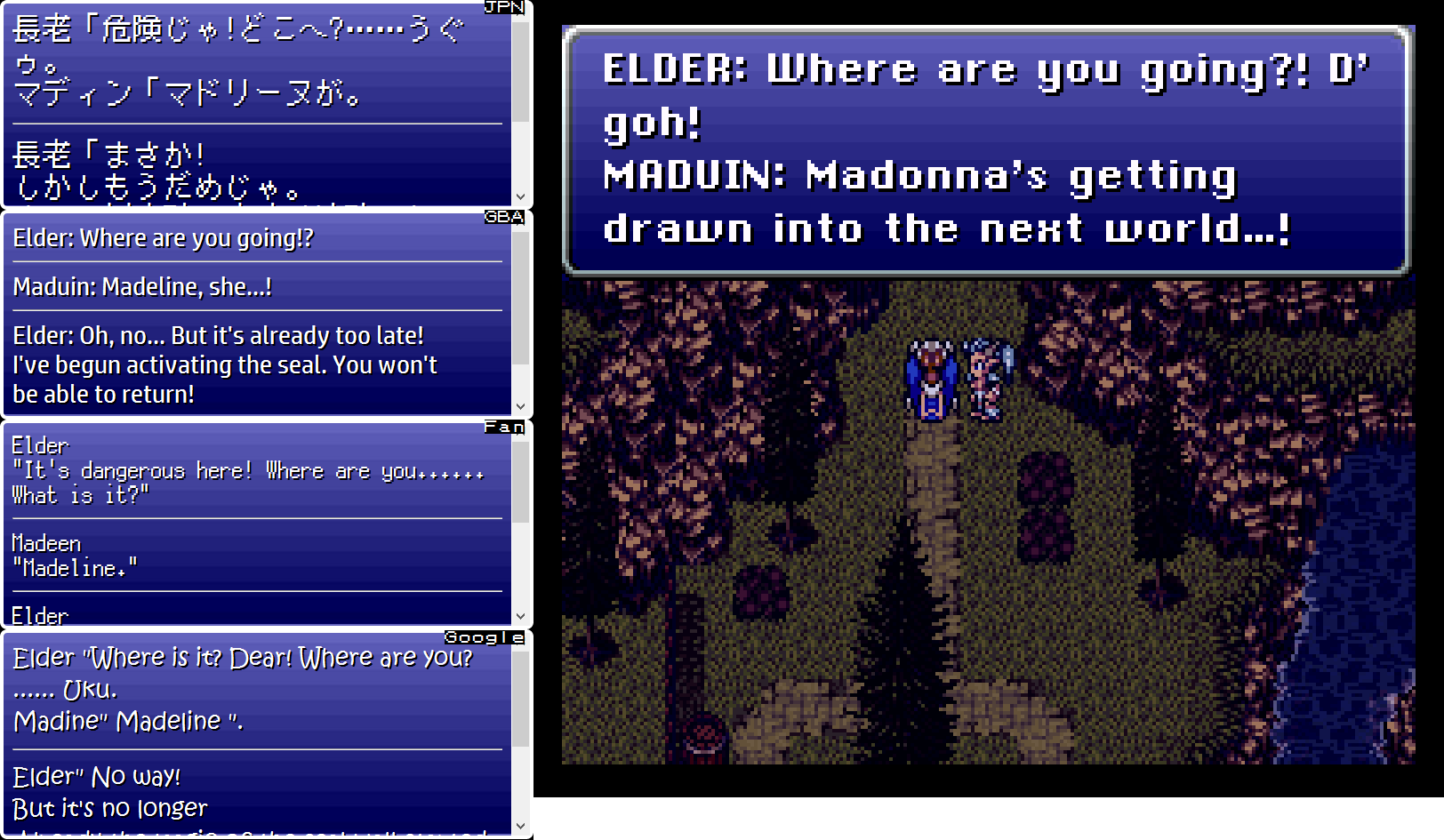
The elder has cast the big magic spell. In Japanese, his dialogue includes a sounds of being in pain, which makes sense. After all, he just said that casting the spell could kill him. The actual sound he makes is uguu, which is a clear sign that he’s in pain.
The Super NES translation keeps this sound intact… sort of. Instead of uguu or something like it, it’s now “D’goh”. I remember not understanding what this was supposed to mean, so I always assumed it was maybe a unique sound or word he uses sometimes. He does look pretty weird and all, so a weird speech quirk seemed plausible.
Anyway, the GBA translation drops this whole sound of pain thing entirely. The fan translation drops it too, and replaces it with the question “What is it?”. I’m not sure why this was done.
Foolish Care

Madonna has been sucked back out into the human world, so Maduin wants to hurry to her. The elder warns him that the magic spell has already activated, so once the gate closes, Maduin will never be able to return to the Esper World.
In response, Maduin says “That fool!” in the Super NES translation. Is he saying this about Madonna? Or maybe the Emperor? I don’t really know, because in Japanese he instead says “I don’t care!”. Basically, in the Super NES line, he’s insulting someone. In the original text, he’s fully prepared to make some self-sacrifices for his otherworldly family.
The GBA translation fixes this mistake, as does the fan translation. Even the Google translation gets it right.
Popping Out
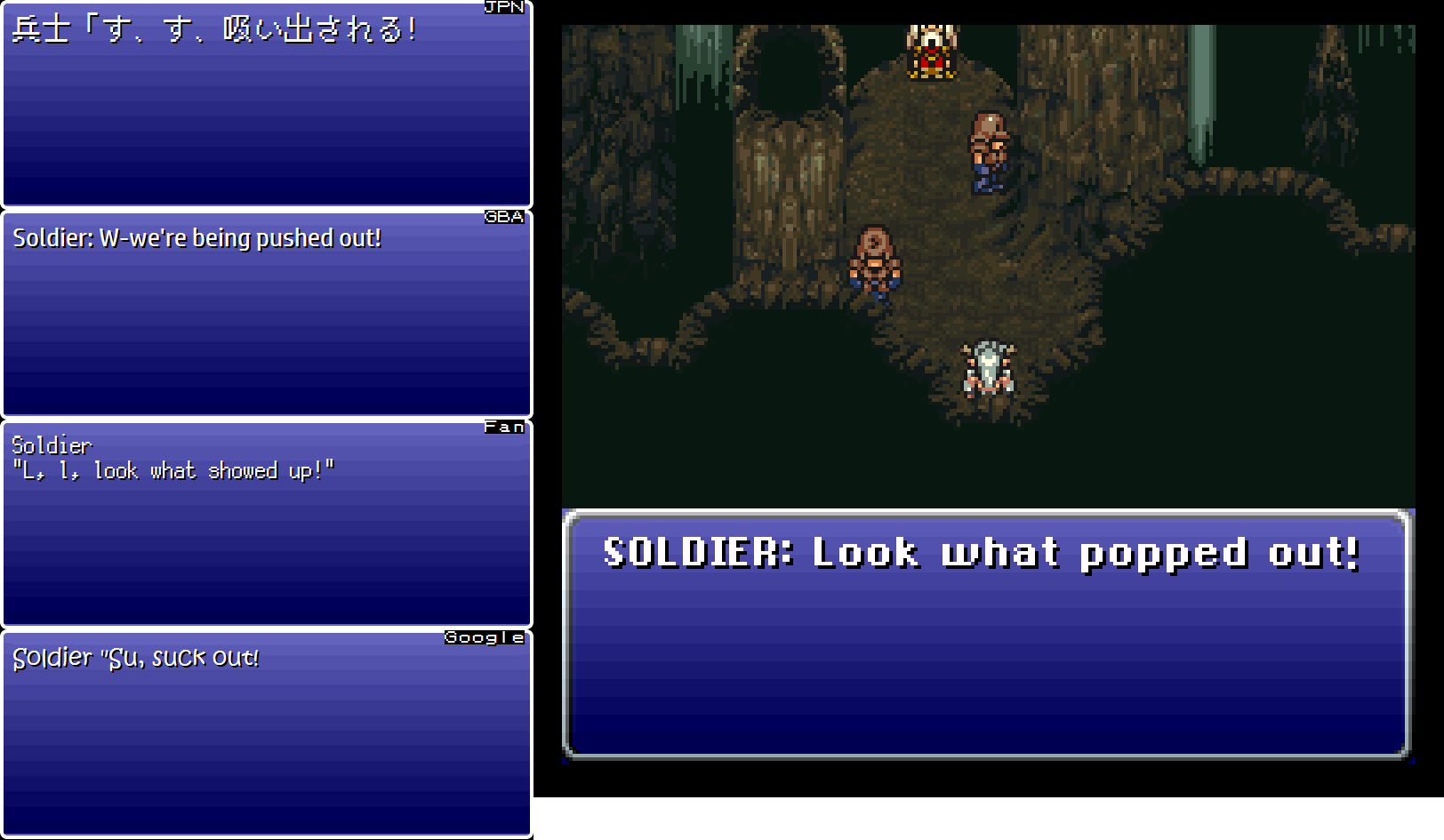
The spell has been cast and all the humans are being sucked out of the Esper World. During this, a soldier yells “Look what popped out!” in the Super NES translation just as Maduin shows up.
The Japanese line is actually quite different though: “W-w-we’re being sucked out!”.
The GBA translation fixes this line, but uses “pushed” instead of “sucked”. The fan translation doesn’t fix the line, however. Instead, it’s “L, l, look what showed up!”, which is clearly a rephrasing of the faulty Super NES translation.
Imperial Daycare
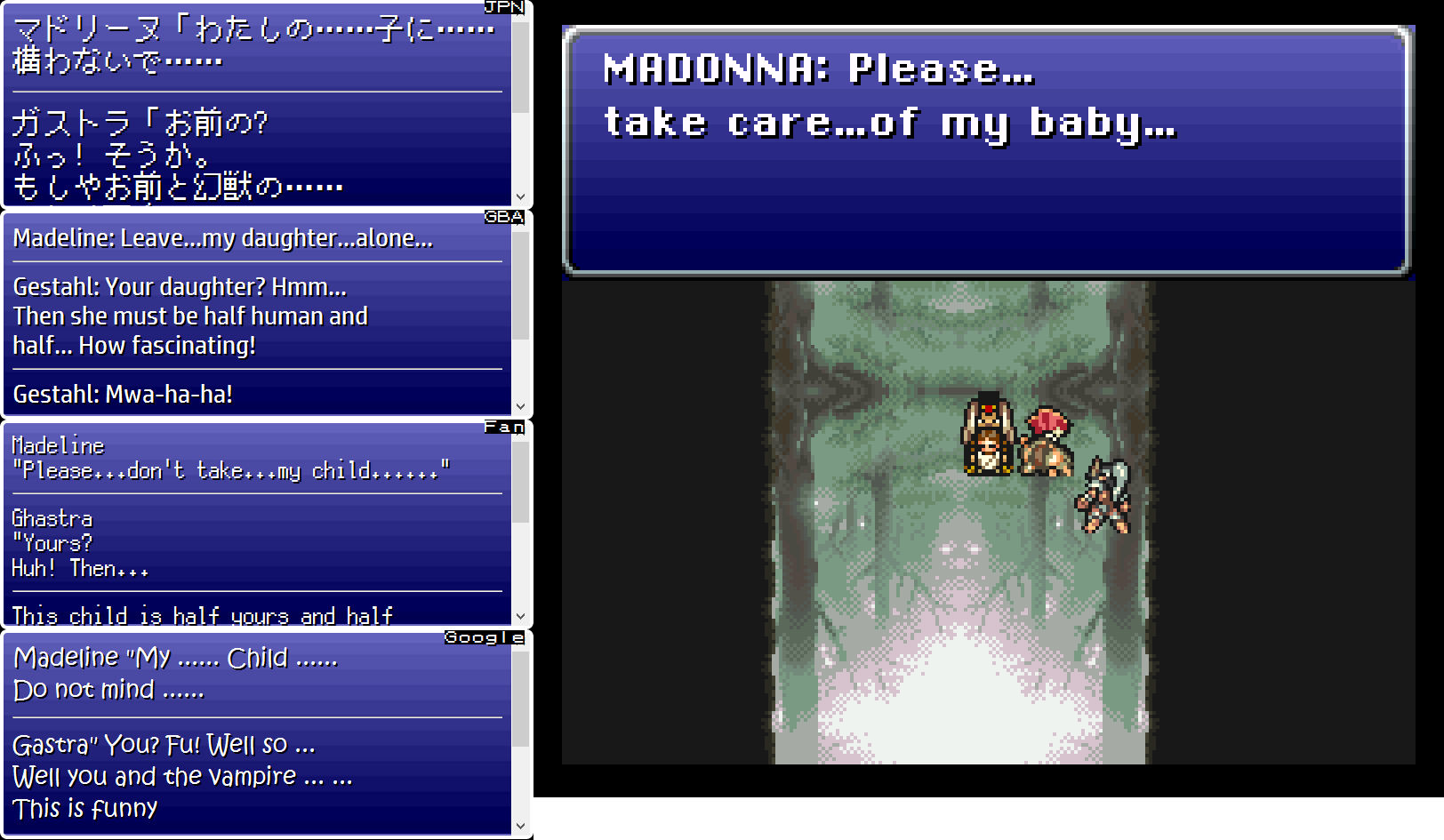
Madonna, Baby Terra, and Emperor Gestahl all wind up in a forest somewhere. In Japanese, Madonna says something like:
Stay… away… from my child…
The Super NES translation says the exact opposite, however:
Please… take care… of my baby…
I’m not sure why this translation change happened. But this line and the “That fool” line above both use the verb 構う (kamau) in Japanese. The fact that both of these lines are so clearly wrong in the Super NES translation makes me wonder if the translator had trouble with kamau. Then again, the Super NES translation has messed up lots of lines in this little Esper World scene, so maybe something bigger than kamau was the problem here.
The GBA translation and fan translation fix this obvious problem.
Power Control

The story switches back to the present day. Terra has regained her human form after reacting to her father’s Magicite. In Japanese, she says:
But I’m okay now. I can control this power as long as it’s for a short amount of time…
This ties in with Terra’s transformation ability in battle and explains why she can only stay in Esper form until her transformation bar turns empty.
The Super NES translation distorts this connection between the story and gameplay by changing this line a tiny bit:
I finally feel I can begin to control this power of mine…
It’s not much, but the omission of “for short amounts of time” left me wondering why Terra had a limit to her transformation ability in battle. I remember it feeling like it came out of nowhere, especially since there haven’t any other special skills with similar countdown bars.
Anyway, the GBA translation fixes this line. The fan translation fixes the problem too.
Man, the Super NES translation really fell apart during this section of the game. I wonder if it’ll continue to be this way. I had no idea there were this many issues until now!


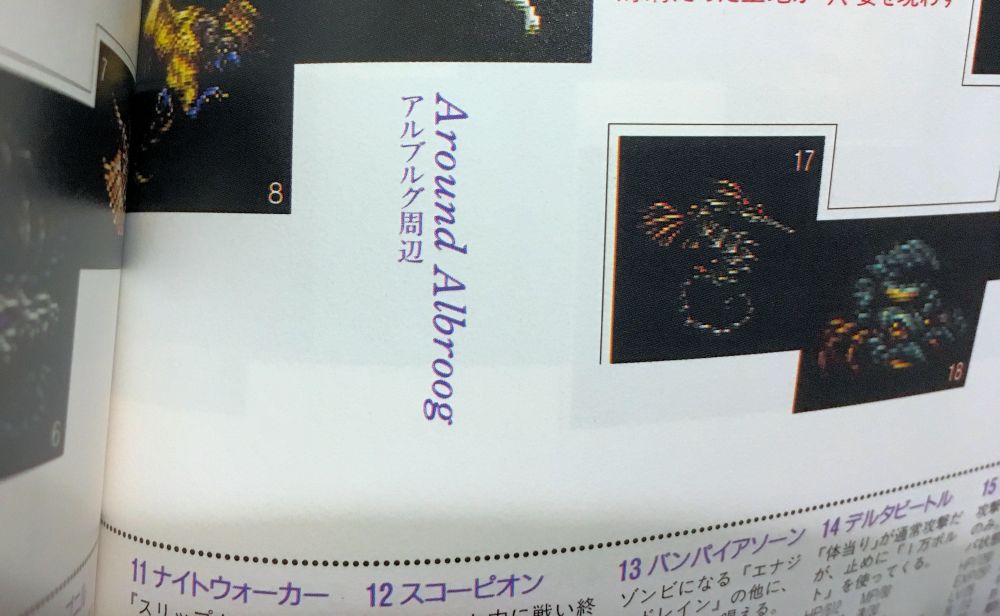
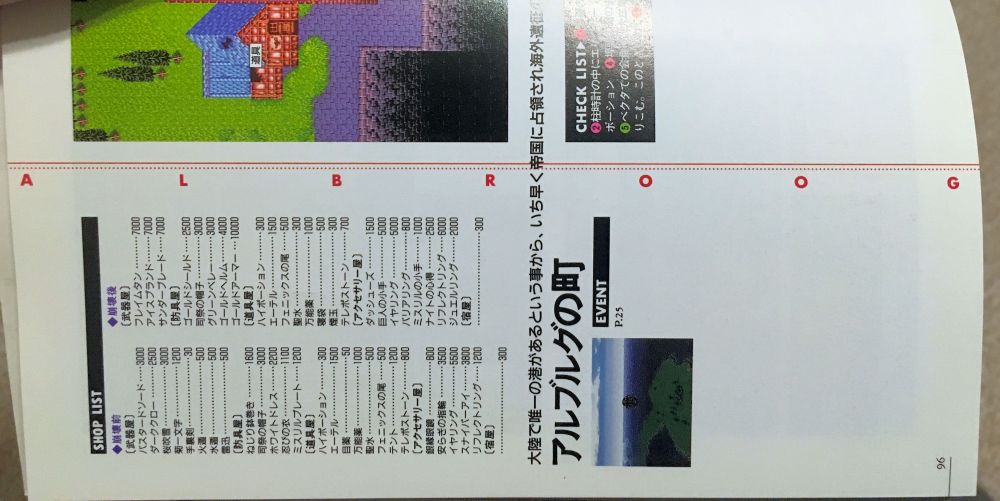
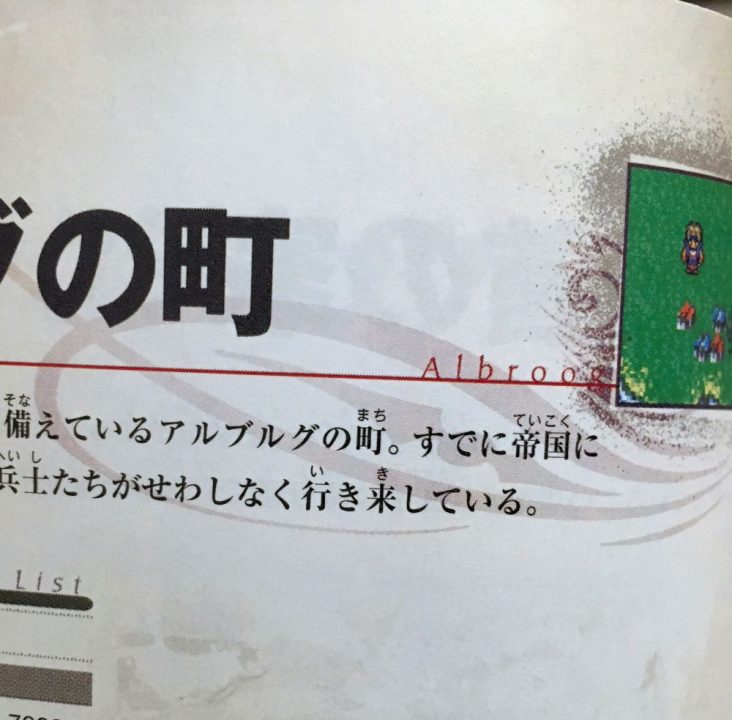
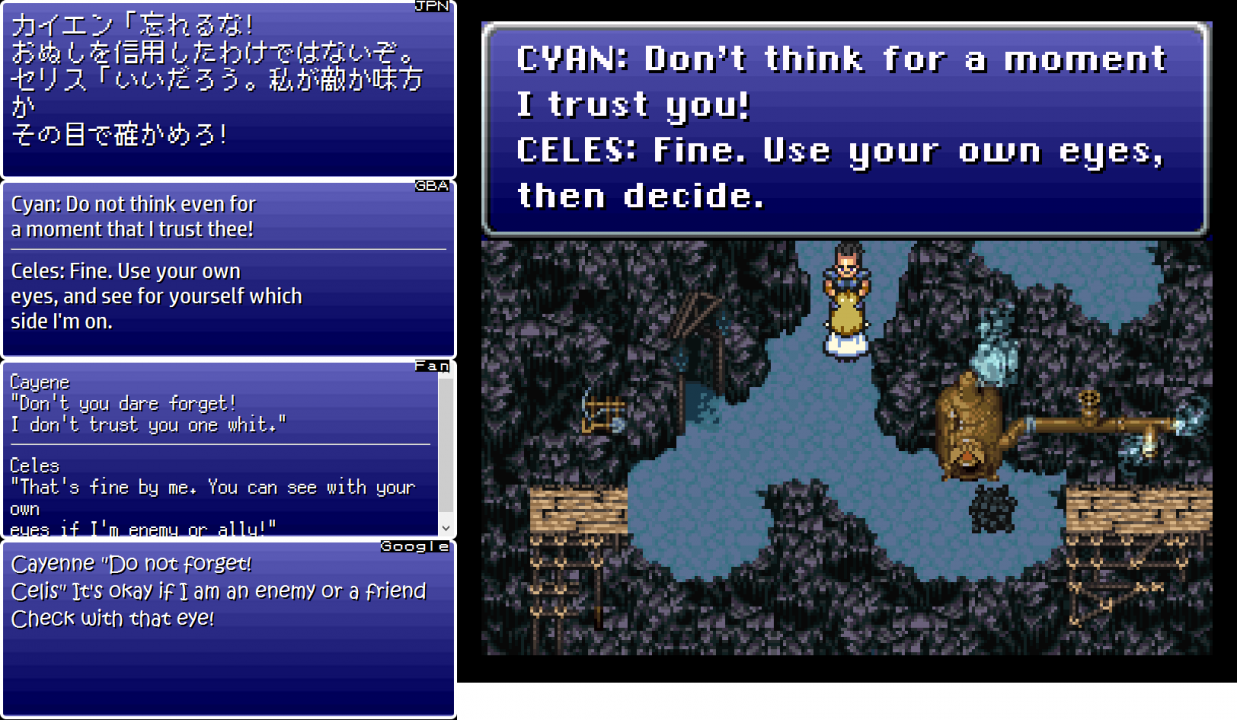
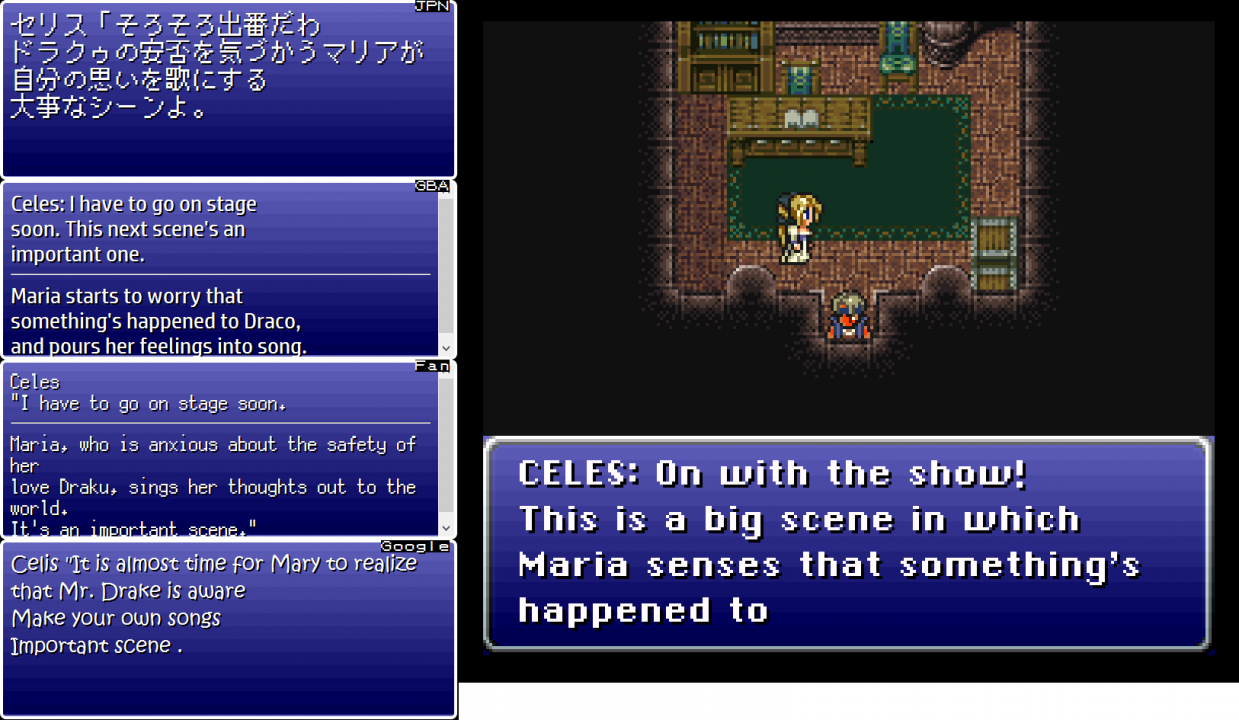
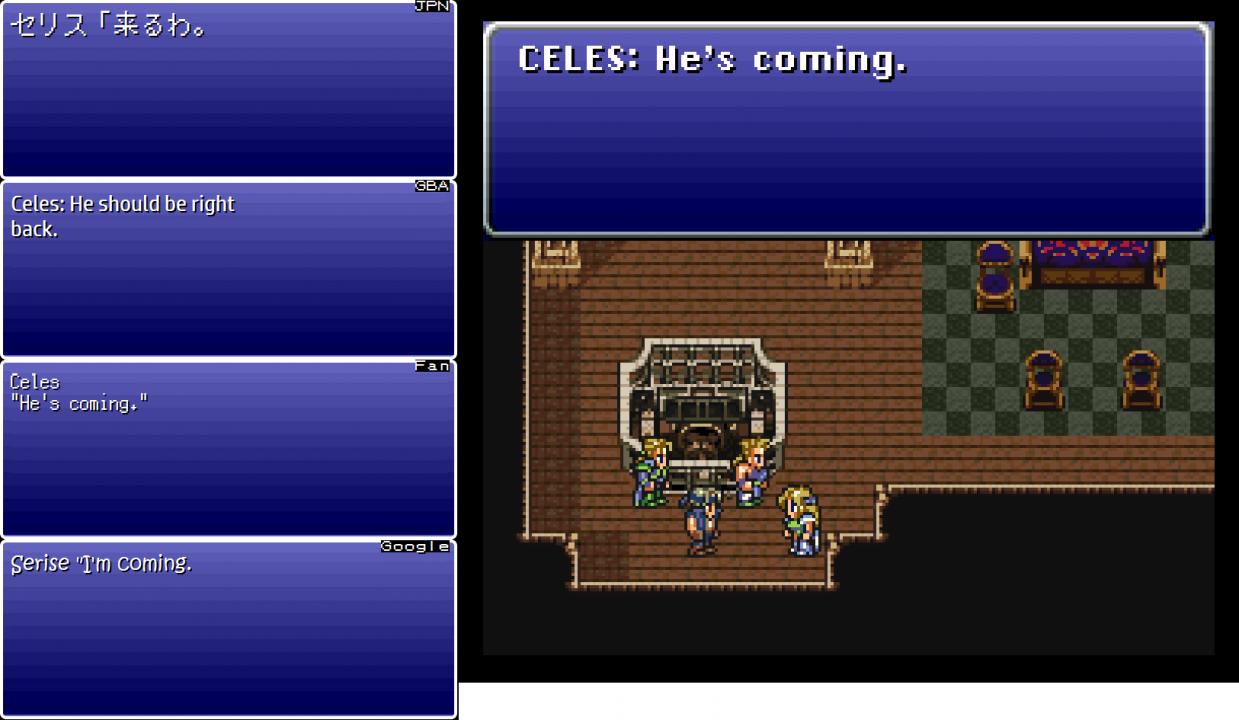
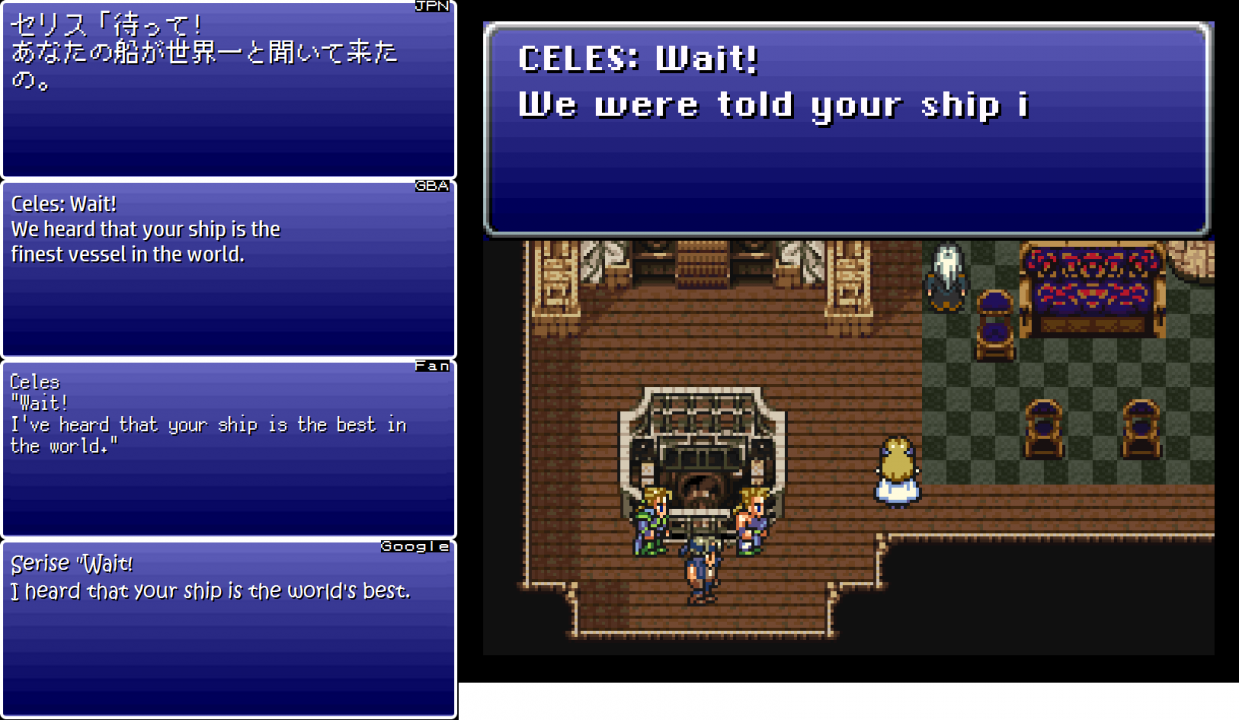
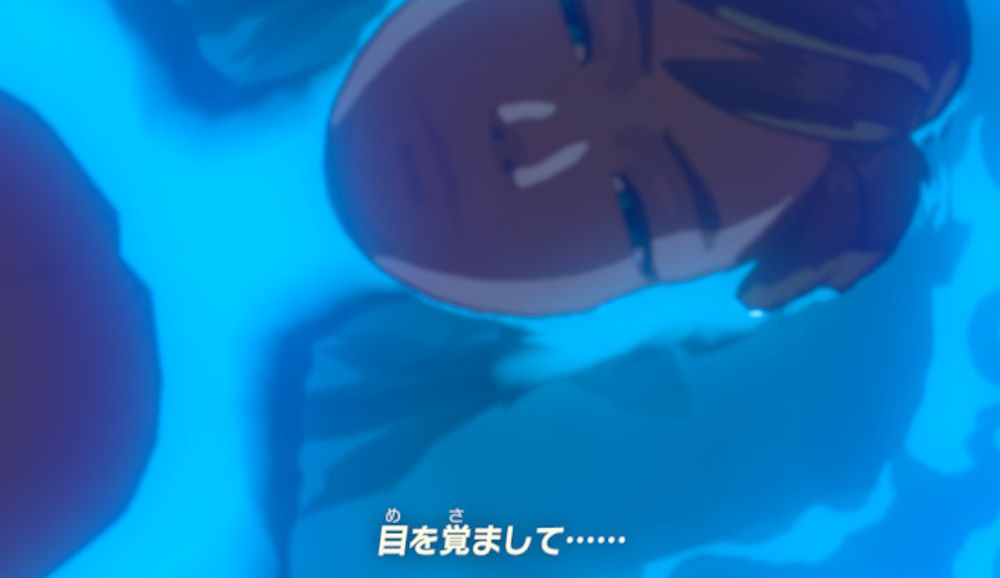

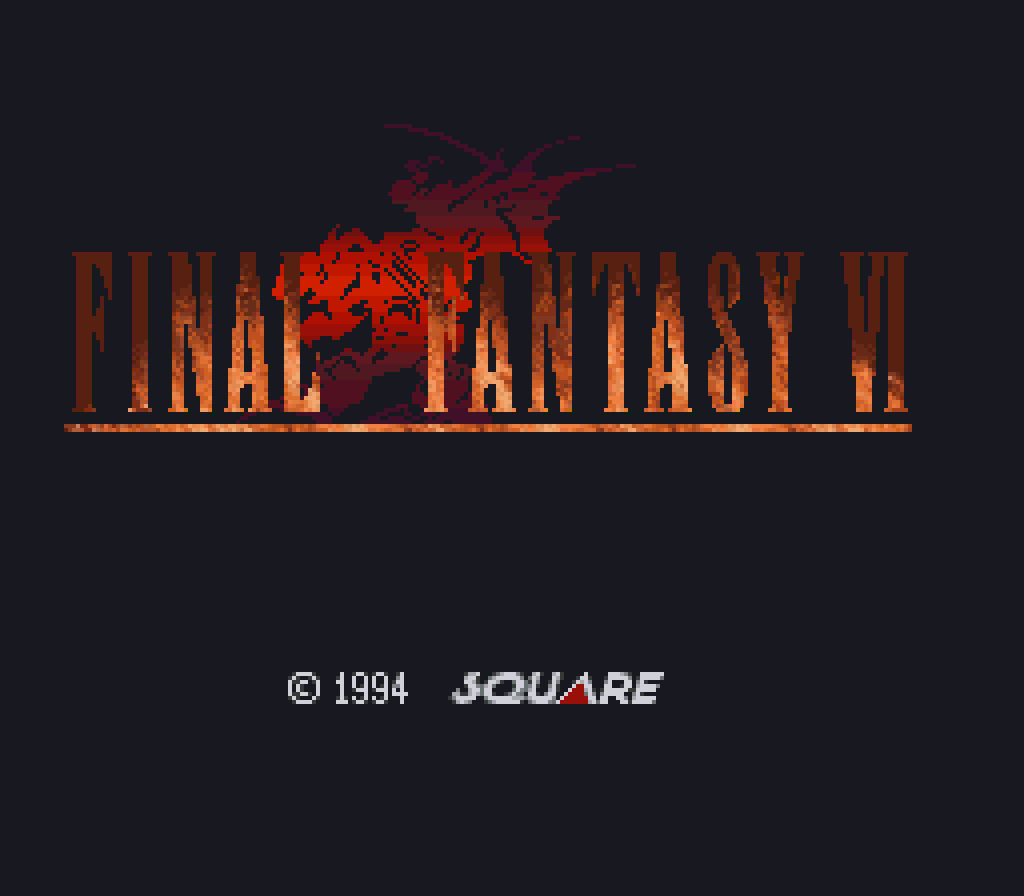
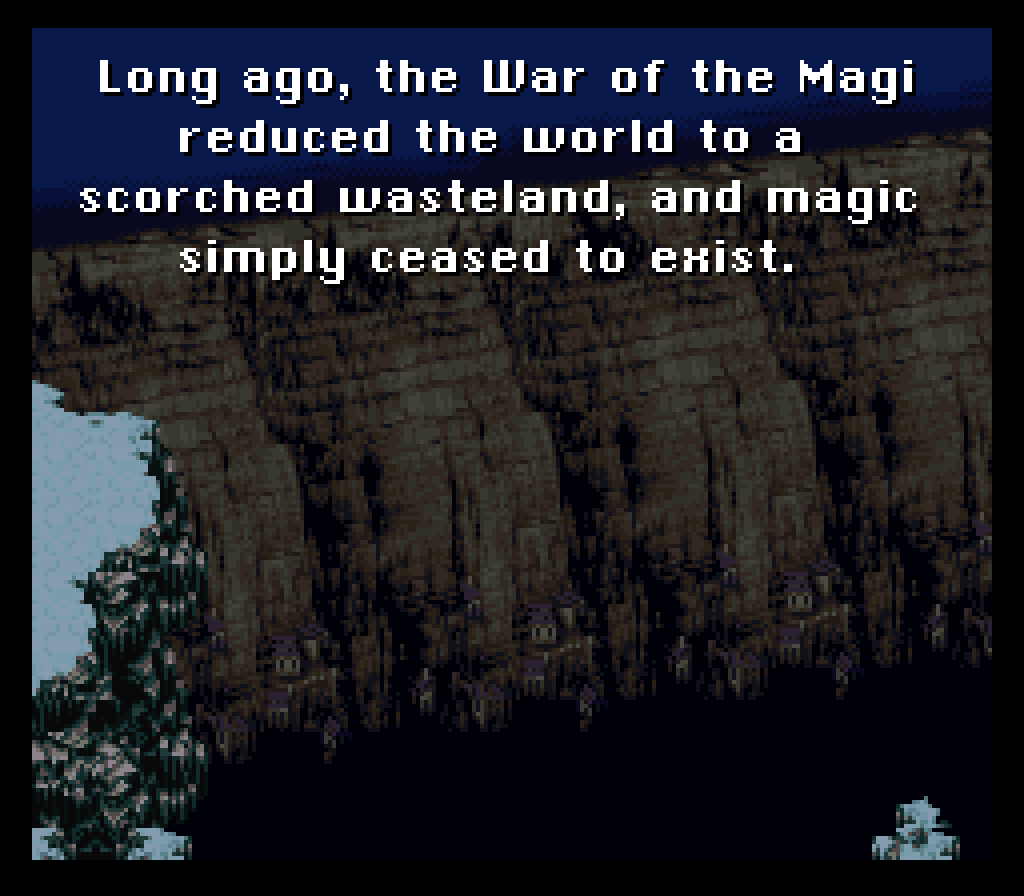
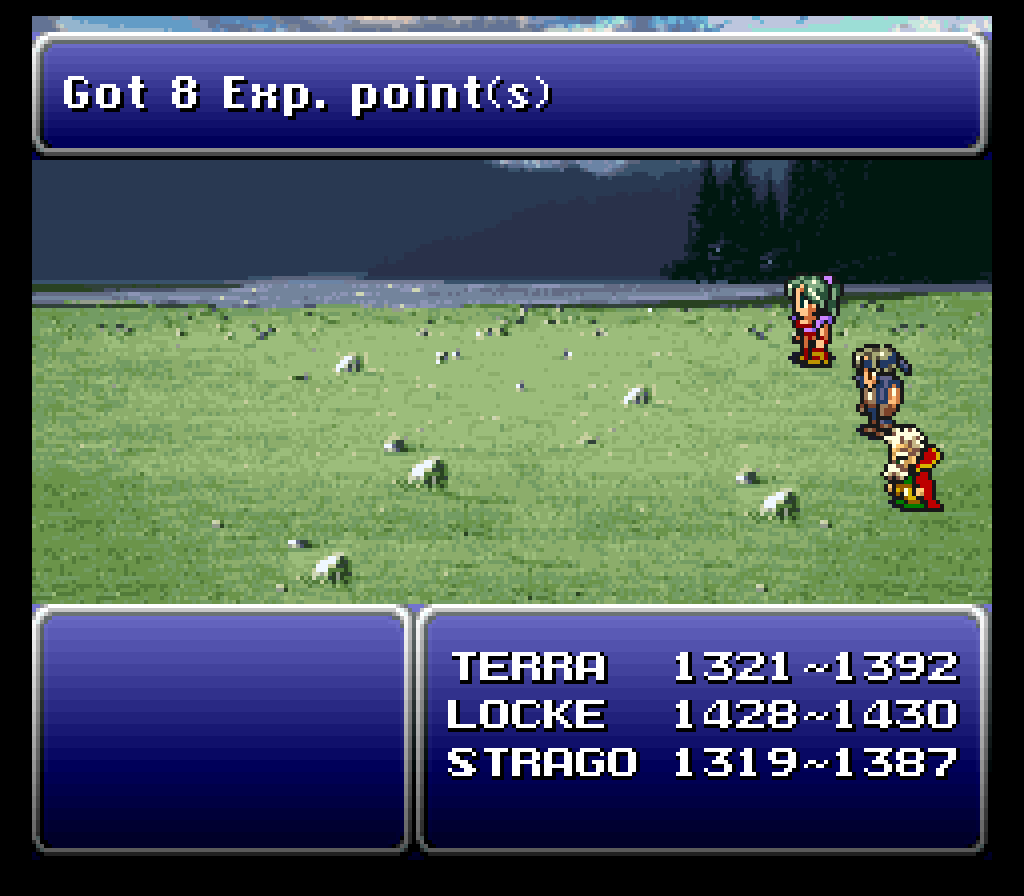
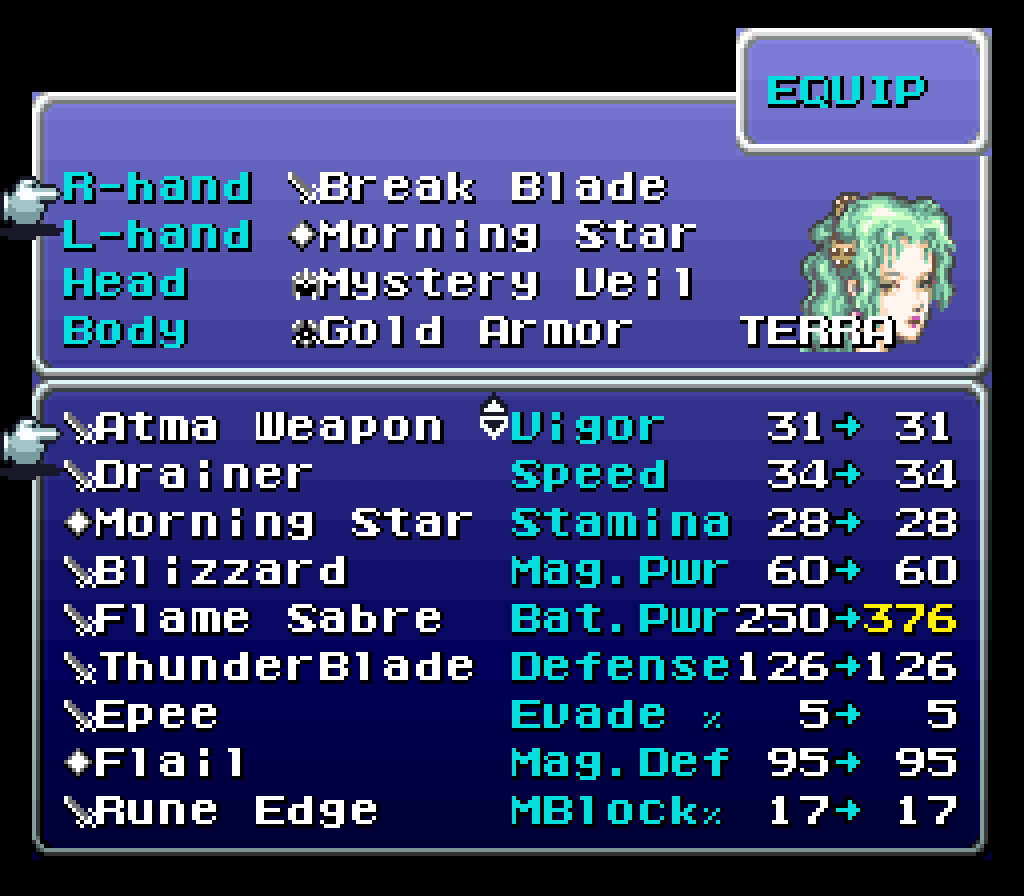
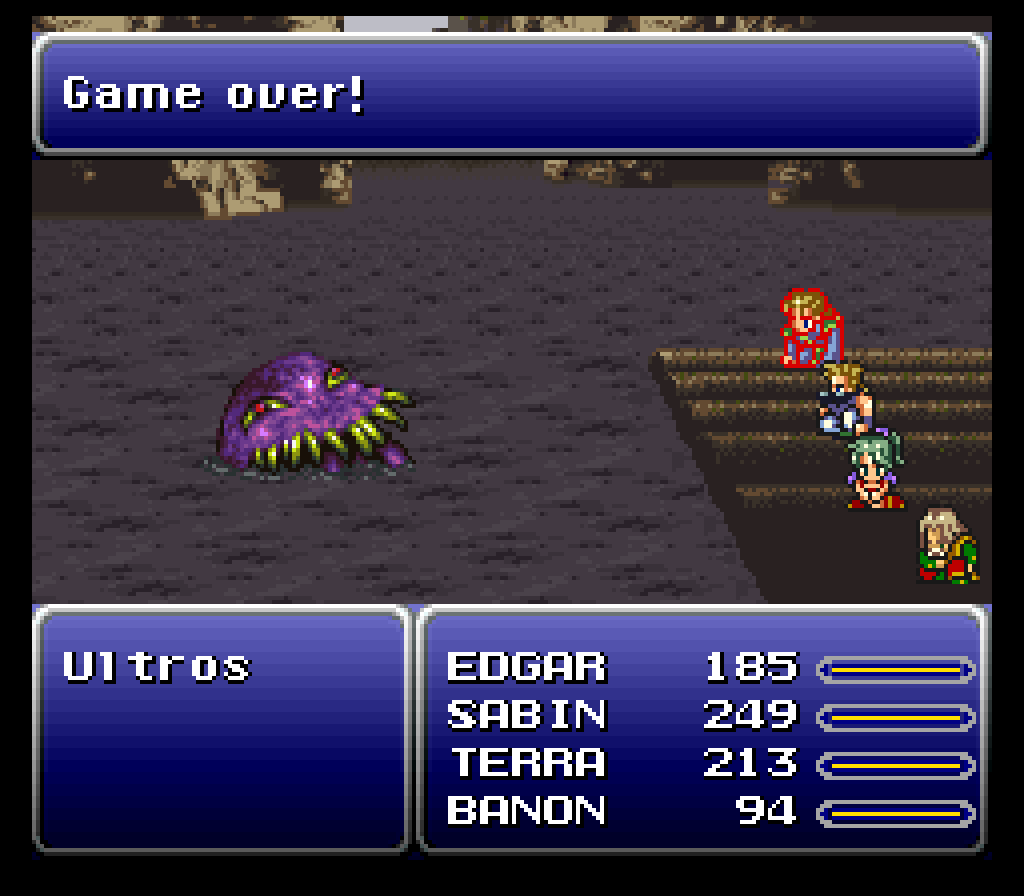
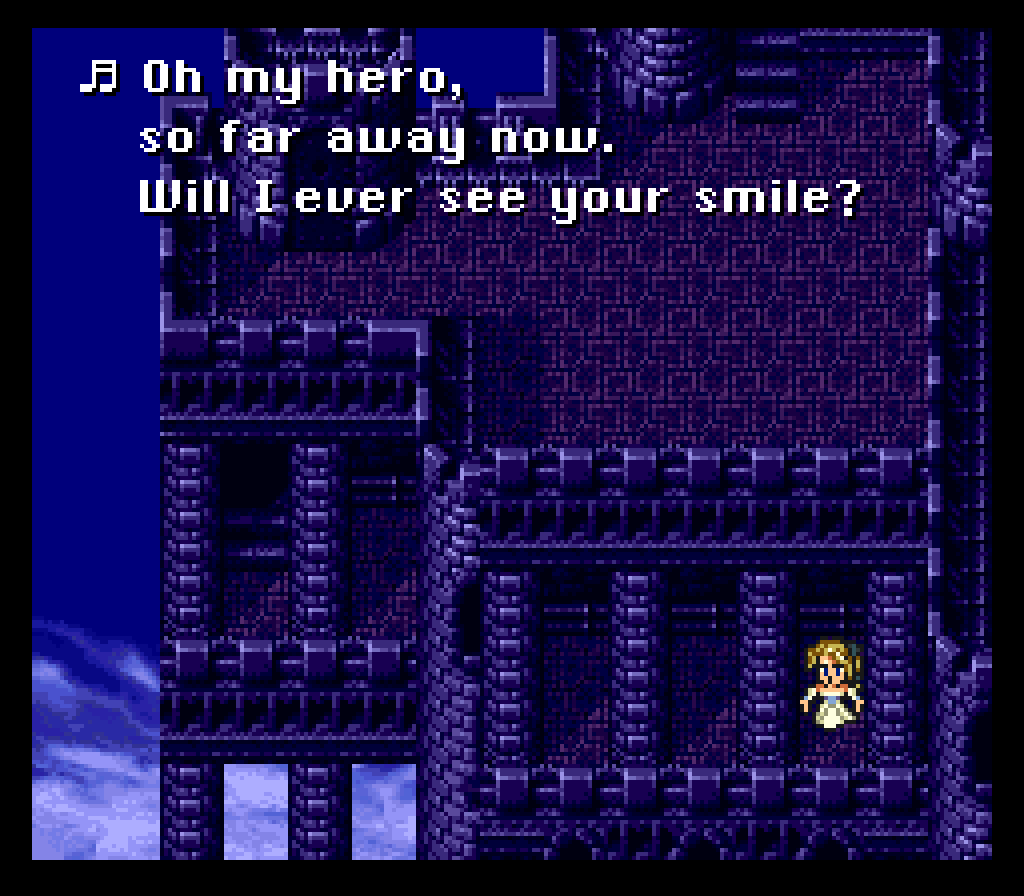
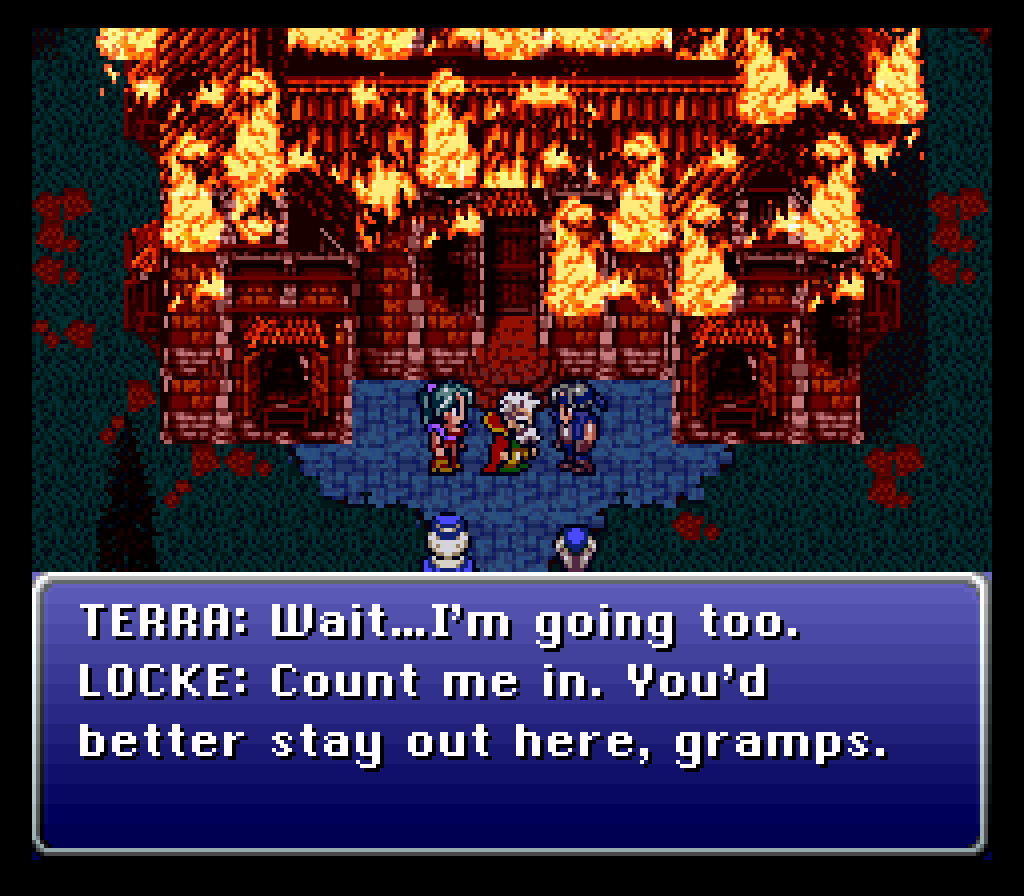
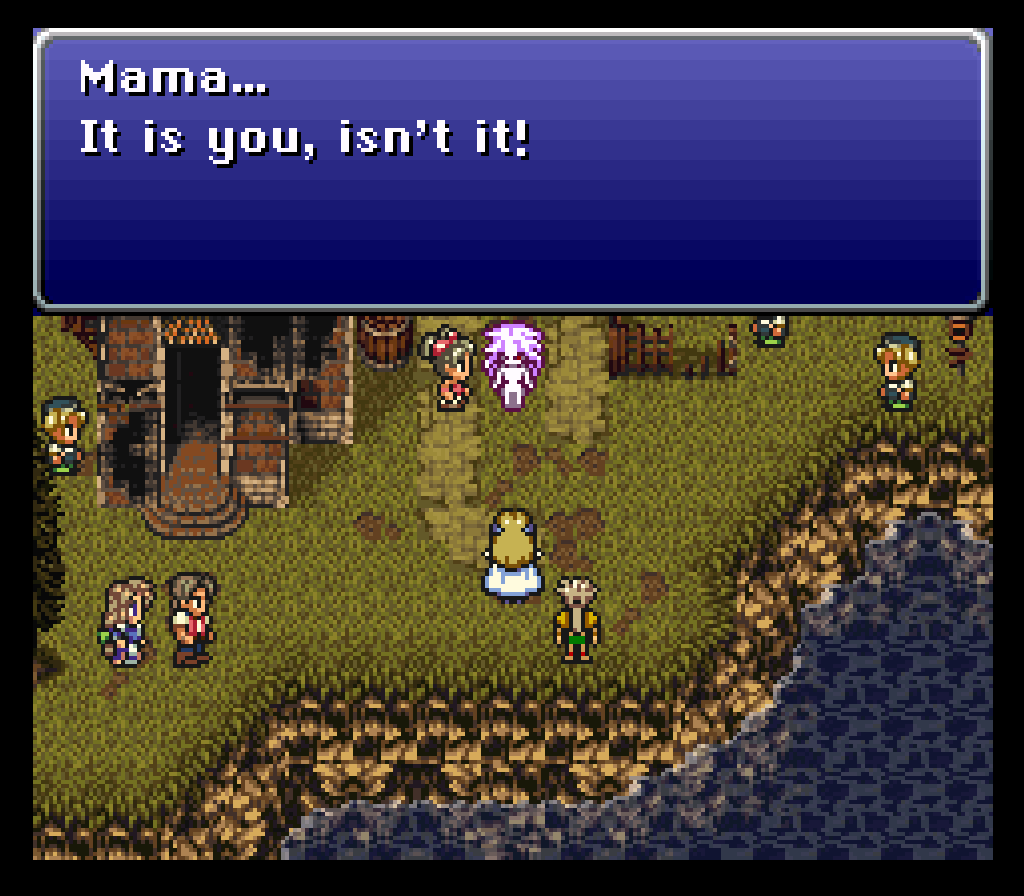
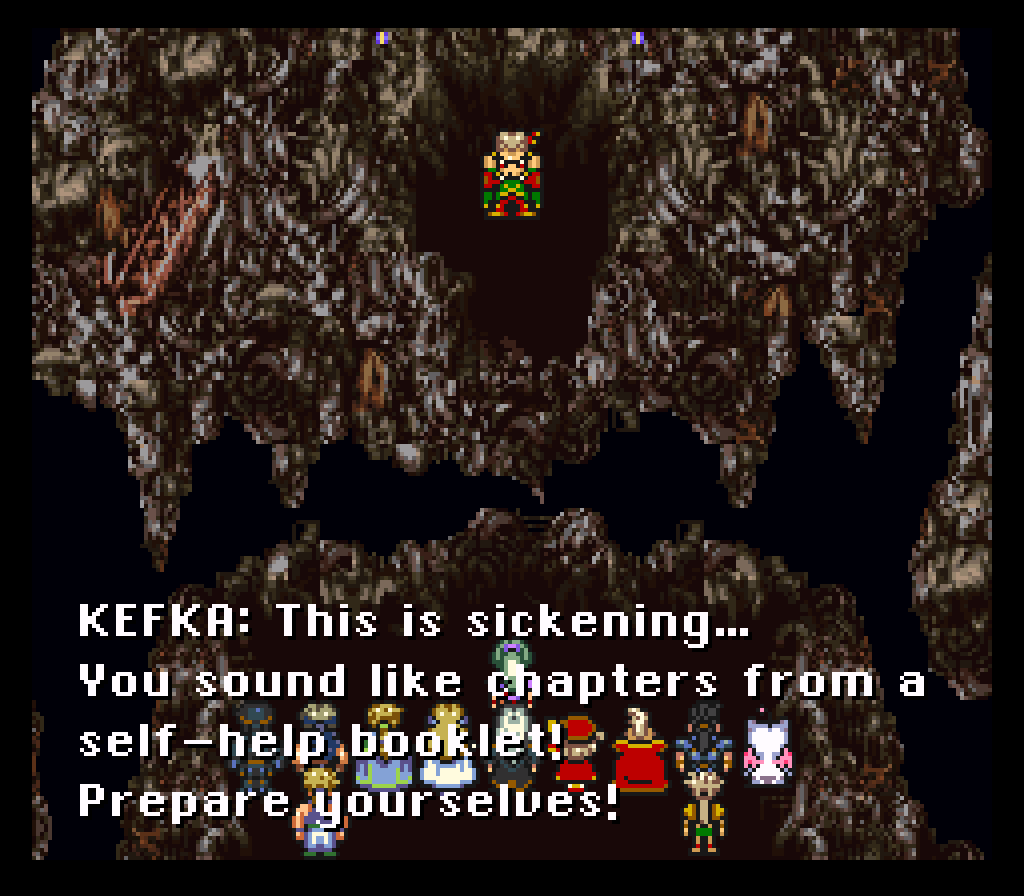
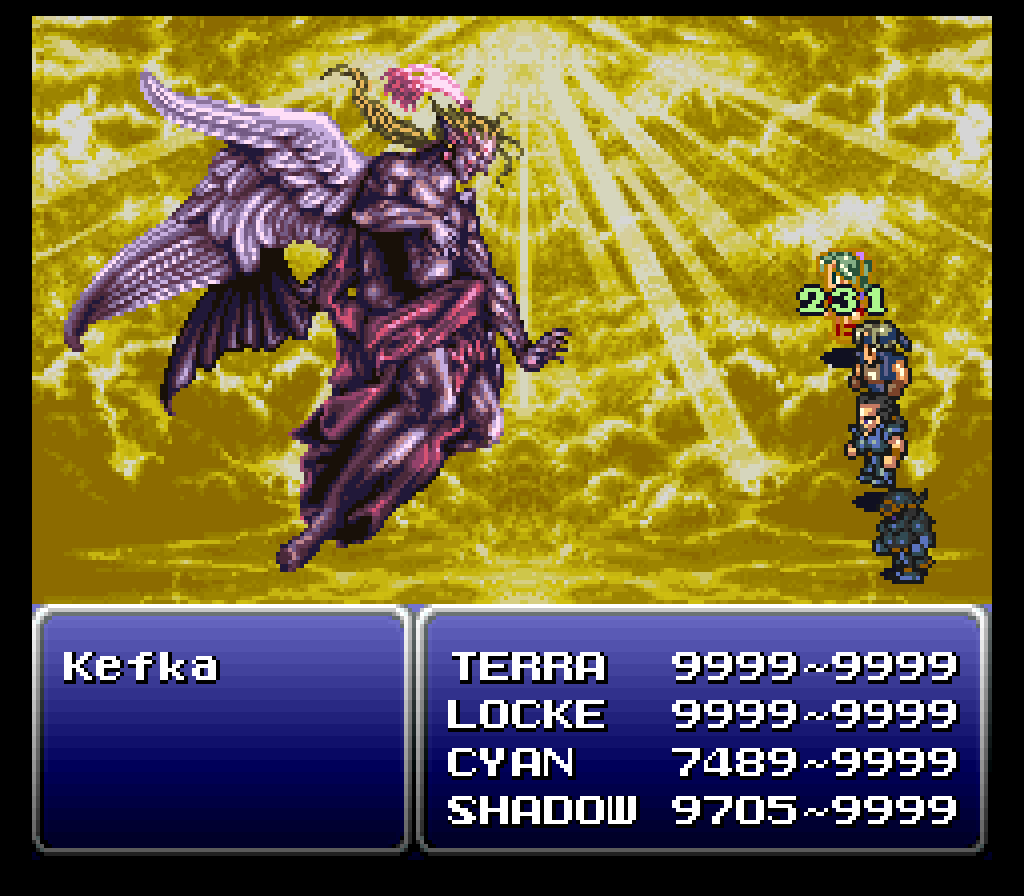
![I'm Stuck in a Video Game [Legends of Localization collab book] I'm Stuck in a Video Game [Legends of Localization collab book]](https://legendsoflocalization.com/wp-content/uploads/2018/05/stuck.jpg)
I took the “Say, you wanna get hitched?” line as the woman so tired of the soldier begging her that she’d take anyone else that came along.
That’s what I always figured as well.
I’m probably in the minority here, but I always thought that the roles had been reversed in the English translation, with the woman pursuing the soldier.
“The fan translation copies the incorrect Super NES line but makes sure to put “damn” back into the line.” is an amazingly perfect encapsulation of the attitude of so many early-mid 2000s fan translations.
I guess we should be thankful that at least they didn’t translate “kuso” as “sh*t” as fan translators so often love to do.
What’s the problem with that translation? The relative severity of it? “Shit” causes more of a reaction in English than “kuso” does in Japanese? Would “crap” be an adequated substitute for most cases?
People that don’t know much about Japanese or translation tend to get annoyed when things are translated in ways they read on the Internet are bad ways to translate.
Mato touched slightly on this back in update 7, when he talked about the different ways “maseki” can be translated.
It is very odd to see a curse word with a censor mark in it. At least, I think so.
My understanding of the issue is that in Japanese, “kuso” isn’t really a swear word. It does literally translate as “excrement” and is often used as an exclamation, usually when things go poorly, but it isn’t really considered a “swear.” You hear “kuso” in plenty of family-friendly media, while the same can’t be said of “shit,” or even “crap” sometimes. So depending on the context, translating it as “shit” can completely change the target audience, cause characters to speak in an overly harsh way (which may seem completely out of character), and misrepresent the intensity of a character’s feelings.
It’s not so much that it’s not “a swear word” that it is that it’s a word that hasn’t been arbitrarily decided can’t be heard by children.
The “issue” is mostly that people that don’t know a lot about languages in general think everything has a 1:1 translation. English has a LOT more words it’s “inappropriate for children to hear” than most other languages, so these people have somehow got into their heads that if a word can be used around children, it can NEVER be translated into a word that can’t be. Translations need to consider context.
It kinda depends on the work. “Shit” is more appropriate for a show like One-Punch Man than, say, Pokémon.
“It’s a topic that’s not taught in schools, obviously”
From the preview images I’ve seen, Dark Horizon “textbook” (a parody of Japan’s famous ESL textbook series New Horizon) actually does seem to cover this subject briefly, albeit in the manner of introducing native Japanese speakers to how it is done in English. Given it’s supposed to introduce Japanese learning the English language to the language’s large vocabulary of casual and profane speech (and to mock it for the native English assistant teachers that had to use it) that’s not unexpected.
” I feel like there’s still some better technical English word out there for the giant glass tubes holding the Espers though.”
Vat? Tank would be slightly ambiguous if it was only used by the espers (the empire has a high enough tech for treaded armored vehicles to exist), but Cid’s use while staring right at one would make it clear. If they made humans in them, “Incubator” with a capital I (As Huxley called them in Brave New World) would work, but it wouldn’t work for FF6.
The fan translation change to Madeen was likely an attempt to bring it in line with Final Fantasy IX where a reference to him had it spelled that way.
“READER CHALLENGE! How would you convey this change in Celes’ character in English?”
Answer: I wouldn’t. There are some things you just can’t translate without sounding really awkward and dumb. Especially since Celes’s development is already obvious from her actions, without needing to be signposted by linguistic quirks.
I disagree. Many westerners don’t seem to realise that the opera scene is a pivotal part of Celes’ character development in this way. Her intro blurb talks about how she’s tough, how nobody has seen the woman that she is. Once she puts on a dress, she starts acting out a feminine role she couldn’t have before. The opera is where the players and the other characters first see her as a woman. Even Locke reacts to her newfound femininity by blushing.
A lot of players I’ve talked seem to think this is too subtle without the linguistic cues of speech style. They therefore don’t really often understand that the opera is supposed to signal a transformation in Celes’s character and also literally mirrors her later suicide attempt, which is another transformation she has later.
(Celes’s character is kind of convoluted; looks like earlier drafts of the script had her allegiance being more ambiguous, since there are a couple of references to her being a spy. This seems like a plot line that was completely dropped.)
As to how to convey that, it’s difficult to do in English writing alone. You’d have to resort to tacky things like saying ending sentences with “darling” or maybe using some English diminutives like “doggy”. Perhaps I would rephrase things like “have a little faith” to “trust me, my heart remains true to your cause” or something similar that alludes to something sentimental — and a good contrast to the earlier “use your eyes and decide”. It would be easier with voice acting — the pragmatics in that case allow you to use more intonation which English writing doesn’t convey.
…so you’re saying that every single English-speaking person, from Queen Elizabeth to Bob the beach drunk, talk the exact same way, and that the concept of different speaking styles is some weird Japanese thing that you’d have to be crazy to try to incorporate into English?
That’s… not really how it works.
1. I did not mean to imply anything vaguely close to what you took my words to mean. I’m sorry.
2. I was a bit sleep-deprived when I wrote what I did, so I was a bit hasty in taking a black and white view.
Conveying the way different characters come across is called character voice writing, and an inability to do so is generally the hallmark of a bad translator. Not only CAN you translate such things “without sounding really awkward and dumb”, it’s absolutely expected of any competent translator.
There’s soemthing interesting about the whole Madeline flashback. I played the GBA version’s official Spanish translation, which seems in itself to be a rather straighforward translation of the English version. When I got to that part of the game, I actually got the impression that Madeline had attempted to commit suicide and had ended in the Esper world by accident. I’m talking about the part where she says she wondered into the storm. I don’t know if it was something about the phrasing of the Spanish translation or if I was just feeling edgy that day, but I swear that’s the impression I got. I wonder if anyone else got that feeling.
Also, I’m pretty sure “Madonna” thing is a religious reference.
“Also, I’m pretty sure “Madonna” thing is a religious reference.”
You know, I find this kinda funny, since the JP version has a more obvious religious reference of this sort much later on.
The furigana thing reminds me, in the Japanese version of Fullmetal Alchemist (the manga), the homunculi’s names are written as the Japanese word for their deadly sin, with the English pronunciation on top. They read both out in the Japanese version of Brotherhood, which has the side-effect of the homunculi getting epithets in the English dub to fit the timings.
Also, the GBA translation of the drunken line makes me wonder how spoonerisms are handled in translations.
Final Fantasy IX has a summon that’s called Madeen in English. When FFIX was released, fans recognized this as a reference to Madin/Maduin, so the fan translation was probably trying to make them consistent. However, their names are actually slightly different even in Japanese: Maduin is マディン, and Madeen is マディーン.
Woolsey mentioned in an interview that he had to translate a bunch of optional dialogue completely without context since the only context he had was a prior playthrough of the game that obviously hadn’t hit every single bit of optional dialogue, and that when he later replayed the game, there were several bits where he facepalmed somewhat at how he had badly misinterpreted certain dialogue that was incredibly obvious what meant in context.
I’m positive that “Wanna get hitched” line is one of those. Very obvious with the visuals present, not so much when all you have a single bit of dialogue you have no clue where in the game is even from.
>READER CHALLENGE! How would you convey this change in Celes’ character in English?
Considering this particular instance involves a soldier gradually leaving that part of her life behind, the obvious solution seems to be… well, having her talk like a soldier, then gradually dropping those mannerisms and have her talk more like your average person. Shouldn’t be the most difficult thing in the world to do.
I wonder where Google got ‘devilist’ from. It seems to have a decent number of search results but it wasn’t in any dictionary I checked, which makes me suspect it’s a recent coinage.
It doesn’t limit itself to complete words. It probably figured out that “-ist” is a way to translate that someone is a practitioner of something and stuck it together.
I believe one of the earlier scholars in the game (Figaro Castle, maybe?) had a similar field of study + suffix -ist name in the Google Translation, which struck me as a bit silly because it was sufficiently close to the official translation, yet slightly different in a comedic fashion. Perhaps the (literal) translation of all Japanese scholar titles ends in suffix -ist?
Sort of? The phrase here is 魔物学者 the last character 者 can usually be taken as “person who does the preceding.” So it functions like -ist in some ways. An alchemist is a person who does alchemy; a biologist does biology, etc… I had to check the dictionary because I usually deal with Chinese and there are usage differences, but in Japanese 医者 is a doctor (literally medical person), 学者 above is scholar (study person).
So what we ended up with is magic/devil, thing/creature, study, person (who does the preceding), or person who studies magical creatures. Which Google somehow pulled devilist out of and wasn’t really wrong.
There are little exceptions that might not fit so well with -ist. 勇者 starts with brave, but braveist would be awkward in English. Instead it’s translated either as hero or brave, as in land of the brave. Gotta keep things like that in mind.
How would I show the change in Celes’ speech? I would write her pre-opera dialogue with very few adverbs, and use them much more liberally post-opera. In English, adverb usage is associated with informal, conversational speech; professional, business-like English keeps them to a minimum.
As for “Danger! Danger!,” I always assumed it was a Lost In Space reference.
“Warring Triad” strikes me as weird when there’s a specific English word for three divine beings. Idk it just sounds thesaurusy. Like it’s technically correct but I can’t imagine anyone describing anything as that, except a writer at the end of their rope on synonyms.
Does the Celes thing come off as kind of sexist in the original?
I don’t know, “Trinity” feels too Christian to me, and Nintendo of America tends to shy from religious references like that.
I think “Triad” brings good imagery of violence to English ears, via the connexion to Chinese criminal gangs. But “Trinity” also brings divine imagery.
I believe “Triad” is the work of Slattery, whom Mato has criticised in the past for using excessively flowery language for the FFIVDS translation. I tend to like Slattery’s style, and I am so far most impressed with his work for FFVI. He struck a very nice balance between fixing errors, retranslating a song for proper rhyme and metre, and keeping fan favourite Woolseyisms. I also favour his use of flowery language in most instances.
Slattery even coined some neologisms like “Feymarch” for FFIV and is justifiably proud that his coinage has spread. I don’t even know why I understand that “Feymarch” means something like “fairy-place”. I don’t know why I know that “fey” is something like fairy, like a magical being, and “march” means a place, but I do. It’s a very good neologism.
I don’t think Mato’s ever really “criticized” him for it so much as said it’s just not some peoples’ cup of tea. It seems to me he has a lot of respect for the skill involved in a translation like that.
Tolkein used both “fey” and “march” (more so the latter by LoTR), so you might have read it there.
Ah, thanks! I have read LotR a couple of times, so that might bee it! Seeing other words that Slattery used like “dweomer”, which seems to mostly come from D&D lore, it looks like he must be a huge high fantasy nerd. Seeing how he kept all of the fan-favourite lines for FFIV and FFVI, he’s certainly at least a big FF fan himself.
How Slattery imparted so much additional joy and extra meaning into FFVI, then went on to grind out so much of the personality of Chrono Trigger like a cigarette butt, will always baffle me.
SPECULATION TIME! (apologies if this has been discussed here before)
So FF6 mages (/Magitek Knights) were created by injecting magic extracted from living espers, whereas most of the game is about using extracted magic from magicite – which turns out, is some 100 times as powerful.
We know that Terra & Celes both underwent the “old-school” magic injection process, and came out with fire & ice magic, respectively. As they gain experience, they learn to use more powerful magic – much like FF mages of old. Primarily, they learn more powerful fire & ice spells. Terra turns out to be half-esper, so she’s got some extra powers going on, like morphing into a dang fireball.
Can we speculate that it was magic from Ifrit & Shiva that was injected into Terra & Celes? Was General Leo injected with Ramuh’s magic, before the latter escaped to Zozo? That would line up with Leo’s lightning magic “Shock” ability.
Seems likely that Kefka was injected with bits from all the espers he could get, seeking more power, which would explain why he sees himself as god.
In addition, Terra / Celes / Leo’s sprites roughly correspond to their magical elemental color: red fire (Terra), white/blue ice (Celes), and green lightning (Leo). Okay, so maybe yellow would make more sense for Leo. >_>
Except Leo very specifically never underwent infusion. Something to do with him being noble or something (not like nobility but in personality).
I don’t know about Maduin/Madin. I’ve heard for a long time that it’s supposed to be the hero from the Irish legend, Mael Duin, but something doesn’t feel right about that.
First thing, I understand that the Japanese romanization of their words can be completely off. Still, I’m curious to see how they romanized this name.
Second, they clearly got the name Cait Sith correct, even down to the pronounciation in Japanese. (Ketto Shii) Which tells me that someone researched how to pronounce things in Irish Gaelic. If that’s true, then why didn’t they get the pronunciation for Mael Duin correct? As best that I can tell, it’s pronounced something like: maul doon. (Forgive me, I am not a Gaelic scholar. I wish I knew someone who was.) But, in Japanese, the genjuu’s name is pronounced Mah-deen. If they just fudged to pronounciation, why this one and not Cait Sith, too? I just don’t buy that someone would look up one name and not the other.
That’s what makes me question this connection. Of course, if someone has some evidence, I would love to see it, and would easily change my mind.
As for how to deal with Celes’s speech differences, I would likely go from formal, clipped, terse language, to more informal, fluid, casual, language.
Madonna is actually an appropriate name for the character. Madonna comes from the Italian words “ma donna”, which means “my lady”. Starting with the Italian Renaissance, the term has been associated with paintings of Mary, the mother of Jesus, particularly images where she’s shown with Jesus as a baby or child. Madeline and Mary are similar in that they are both mothers of beings greater than themselves.
Also, about the word “laughter” being contained in “slaughter”. In The Dark Knight, there’s a scene where the Joker steals carnival truck that says “Laughter is the best medicine” on the side. However, we see that he’s spray painted an S, so that it says “SLaughter is the best medicine”.
While that Madonna thing is true, I’m pretty sure something like 90% of Americans would hear that name and immediately think of the famous singer, especially in the time when the game first came out on the SNES.
How would I convey Celes’ change? I feel like this kind of thing is a lot easier to do in English when your game has voice acting. Two examples come to mind that remind me of this.
Aigis in Persona 3. She’s a robot who gradually gains emotions over the course of her story arc. In Japanese, this was conveyed by her speaking style changing. In English, Aigis talks in “robotic monotone” to begin with (also rarely using contractions), and gradually begins to emote more as she develops, and by the end of the game she speaks normally.
Fie Claussel in Trails of Cold Steel. She starts off as a stoic, emotionless mercenary, and so her voice actress reads her dialogue in a deliberately stilted and monotone way. As she starts to open up to the group, her VA emotes a lot more, and by the second game she sounds a lot more natural. Compare Fie’s victory quote at the start of this video https://www.youtube.com/watch?v=I4k7t-rmzxk to her equivalent in the second game at 0:33 of this video https://www.youtube.com/watch?v=MDW09d-OR9k
So, no answer in Japanese either on how Terra remembers something before she was born?
I always got the impression that the Gestahl we see here isn’t the real man. Killing Madonna struck me as VERY out of character for the emperor, since she was just Some Person and not a political opponent, especially in an era where he SHOULD have been wanting to learn everything he could about Espers which I would assume would include studying a woman who lived among them. But then…remember how Kefka is later able to so perfectly imitate Gestahl that even Leo is fooled? That seems like something he would do.
I also always figured that “I tired living in the human world” was a typo rather than a complete mistranslation, and that Maduin was saying he had once lived there (implying that he knew somethings about them). It’s so strange!
Tying into my earlier comment, Cid doesn’t know what Magicite is despite working with Espers for 20 years. Kefka knows it on sight. And yes I KNOW Kefka’s official backstory but what I thought for so long (and still think it would have been awesome) is that Kefka was a renegade Esper himself and that’s why the infusion had such a backfire. As it stands with him being just Some Guy, it leaves a lot of questions unanswered such as the above and the bit about Gestahl being out of character in the Esper world.
“So, no answer in Japanese either on how Terra remembers something before she was born?”
I took it as the espers/magicite sharing a vision with the party.
Gotta say, I quite liked the royal we used by Gestahl in the SNES version (even though it was inconsistent). It fit his character well.
Re: test tubes/capsules – test tanks, maybe?
In Italian, drunk speech is conveyed by inserting a “c” (possibly followed by an “i”) after every “s” to turn other sibilants into a “sh” sound. You can see that in this part of the Italian point’n’click adventure “The Big Red Adventure”: https://youtu.be/Kmg-DcPc9x0?t=9s
“Ehi, amico! Che ti sciuscede? Come mai quella fascia da funerale? Sciembri un cane basctonato.. Hips!”
“Hey, my friend! Washa matter wish you? Why sha long faysh? You look like a whipped dog. Hic!”
Note how “succede” (“soo-chay-day”) became “sciuscede” (“shoo-shay-day”), “faccia” (“fuh-cha”) became “fascia” (“fush-shuh”), “sembri” (“sam-bree”) became “sciembri” (“sham-bree”) and “bastonato” (“bus-toe-nah-toe”) became “basctonato” (bush-toe-nah-toe).
Interestingly, this method sometimes violates Italian spelling conventions. “Basctonato” would usually be pronounced “busk-toe-nah-toe,” since the “c” is followed by a consonant, but inserting an “i” and spelling it “bascitonato” would turn the pronunciation into “bush-she-toe-nah-toe.”
Just some thoughts…
*I’m mildly disappointed that the line about Kefka being the first magical test subject was a mistranslation. The idea of him being the first added a hint of tragedy to his backstory, while him being one of the first just made it seem like it was more bad luck.
*On the other hand, I am glad that the whole idea of the Espers living in another, parallel dimension was, in fact a mistake. While I love the idea of there being a mystical realm of Espers, it never made much sense when I was a kid why a landmass breaks off onto the sky and why these statues, which were supposedly in another realm, were now here in our world and accessible. In Japanese it’s much more clear the Esper realm is a physical place in the world, just highly inaccessible.
*I got the impression it Gestahl was using “we” to lead the army and playing up the role of the leader. For him to just say “I” makes him come across as more generic in his evil and less “using Imperial loyalty” for his own ends.
*Also, I prefer the mistranslation of Madonna asking Gestahl to take care of her baby. I got the impression that Madonna was half-delirious and thought she was dying from the force of being slammed by the spell, so she asked a kindly old man a last request. However when he openly revealed his evil nature, Madonna summoned all of her strength to take Terra back, only to be knocked down, Weirdly, I didn’t get the impression that Gestahl killed her, just knocked her out.
*As for handling Celes’ pronoun change…this is one case where it would be best not to handle it at all, just leave her speech the same. To me, it was clear even as a kid the opera scene was the major event that starts more rapid changes — Celes doesn’t even have a proper character theme before then. Giving her different dialogue would be gimmicky, especially since her visuals stay the same all the game. Some changes don’t have to be conveyed through a speaking style; Celes’ actions speak for themselves.
I agree with you on the Gestahl/Madonna scene. I think the mistranslation adds a bit of extra tragic flavor to the scene. I also always assumed that she had been seriously (or fatally) injured by being flung out of the cave, and that Gestahl just subdued her and left her to die.
In general, I’m surprised by how well the SNES version works despite the frequent mistranslations. I do think that some cases that Mato identifies as mistranslations could have been justified as localization choices — Kefka being “the first” rather than “one of the first” being one of those — but mostly I’m OK trusting his intuition on whether they were intentional. But I think it says something interesting about the storytelling techniques used in the 8 and 16-bit eras that you could fairly significantly garble the dialogue during translation and still get a game that more or less makes sense. I feel like that would be considerably harder with the much more intricate plotting of later generations.
“*I’m mildly disappointed that the line about Kefka being the first magical test subject was a mistranslation. The idea of him being the first added a hint of tragedy to his backstory, while him being one of the first just made it seem like it was more bad luck.”
Some of Woolsey’s mistranslated to me read more like concatenations or condensing several ideas into one line using creative license. Maybe that’s rose tinted glasses and nostalgia talking, and it absolutely isn’t the case with every one, but this example seems like it. Every letter counts in a cartridge game localization.
“Kousho. It’s hilarious to the elder!” was hilarious to me. Anyone else?
I always thought it was incredibly weird how Madeline wakes up to immediately go all YOU WEAR SHINY? It makes so much more sense that he had put his pendant on her while she was recovering; her sprite even moves to the side like she’s checking it out on her own body rather than toward him to accept a proffered gift. They had to squeeze a romance out of a minute and a half, so getting that detail wrong sure messed the flow up. Instead, she hilariously sounds like a typical greedy human out to take from the espers. Or bad Crono when meeting Marle.
“Phantom bean world” Hell yeah, new Discord name.
I’m sure I had a more important comment than that, but whatever. Thanks for doing these streams/pages! I love it.
Hm I like Warring Triad from GBA. I could live with say Warring Trinity too.
When I came across the scene with Madeline and Gestahl in the hack I mentioned before, I saw pretty glad that it played out differently with her saying that he should back off (and that it’s the same in the original). The SNES translation is rather comical with her suddenly realizing who she’s talking to and doing a 180. Not to mention that it just makes so sense for her to think that there’s just a random old man after she’s sucked out with a bunch of imperials. Unless she hit her head really badly, she should be aware that the only people in her vicinity would be imperial soldiers, if not the emperor himself.
I wonder if “Madin” was meant to be another Star Wars reference a la Biggs and Wedge — there’s a General Madine in Return of the Jedi.
I’m curious about Edgar’s line, “Gestahl already knew the secret of the espers’ power back then” — it seems like you were about to say something about it in the video but decided to move on.
That exchange threw me, where Edgar says Gestahl already knew the secret of the espers’ power, and Locke adds that Celes’s power came “at the expense of” an esper. I think the intent is that Gestahl knew the espers had power and humans could steal it, and “expense of” means they tortured an esper and extracted its essence through one of those tubes. But the line about “the secret of the espers’ power” makes it sound like Gestahl knew about magicite, which…he clearly didn’t, as indicated by both Cid and Kefka just learning this for the first time after the espers die in the Magitek Research Facility.
I’m curious, is that ambiguity there in the original Japanese, or is it just a confusing choice of words in the translation?
(Also: all the rumors about Phoenix also seem to contradict the premise that Gestahl doesn’t know about magicite prior to the heroes’ attack on the MRF. It doesn’t really make sense that Gestahl’s had a piece of magicite this whole time and it’s famous enough that there are rumors on other continents about this treasure that can restore the dead to life, and yet Gestahl doesn’t know what magicite does.)
One possibility on the “How much did Gestahl know about Espers” question is that he *did* have magicite but didn’t know how it was *made*. After all, unless he saw one created, how likely would he be to surmise a piece of magicite was an Esper’s remains rather than a particularly heavily infused gem? Heck, perhaps the first efforts into the extraction process involved trying to milk the Phoenix magicite, leading both to its damage and why it wound up being squirreled away by the emperor.
I wanted to point out that, in the SNES font (which is a different font than the one that appears in your program) the kanji “嵐”, for storm, looks a lot more like “風”, for wind, than it does in your program. I can easily understand how the translator confused them.
I’ve noticed one thing about 16-bit games is that the fonts seem to drop or combine strokes together. I assume it’s a resolution thing or due to some other technical difficulty. If you’re not familiar with the kanji already, it’s sometimes challenging to identify every part of it from SNES fonts. This could be make for an interesting localization topic in and of itself.